Taking Control of Bulog for the Sake of Self-Sufficiency
Prabowo Subianto intends to place Bulog under the president’s control, changing its autonomous status and eliminating its commercial functions.
maaf email atau password anda salah
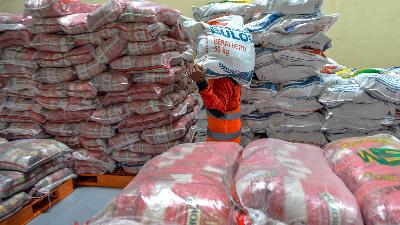
Prabowo Subianto intends to place Bulog under the president’s control, changing its autonomous status and eliminating its commercial functions.
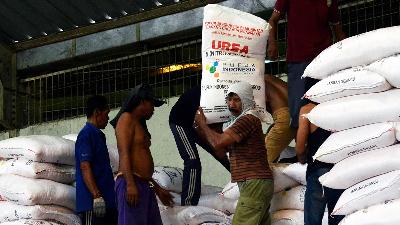
Agriculture Minister Amran Sulaiman aims to take control of state-owned enterprises in the agriculture and food sectors in an attempt to orchestrate food self-sufficiency.

Minister Amran Sulaiman recommends changes to regulations on food sector institutions, citing self-sufficiency as the primary reason.

The government writes off non-performing loans of fishermen and small business owners. Detailed criteria can prevent moral hazards.

Hashim Djojohadikusumo is leading the Indonesian delegation at the climate change conference COP29 in Azerbaijan. But he is more a representative of corporate interests.

The new government is trying to erase traces of past human rights violations. This hurts the victims and their families.

The investigation into the Communication and Digital Affairs Ministry employees backing online gambling is expanded to include many people. Ill-gotten gains from a political operation.
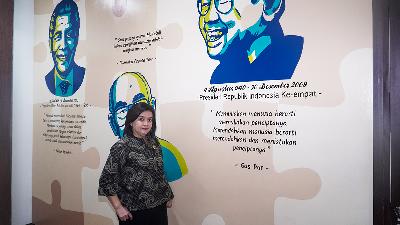
National Commission on Human Rights (Komnas HAM) Chair Atnike Nova Sigiro on human rights enforcement in the Prabowo Subianto era.
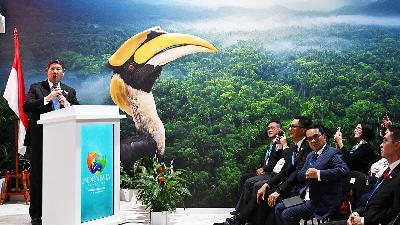
The presence of Hashim Djojohadikusumo at COP29 in Azerbaijan was considered as bearing a conflict of interests. He was promoting the business of Arsari Group.

Prabowo’s close associates worked to prevent the issue of serious human rights violations from resurfacing. They prepared a white paper containing a narrative aimed at clearing Prabowo’s name.

The number of people suspected of protecting online gambling sites increases to 18. Employees of the Communication and Digital Affairs Ministry are involved.
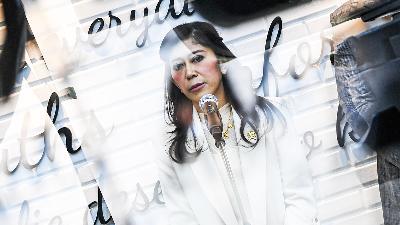
The Communication and Digital Affairs Ministry is tidying up house now that 10 of its employees are accused of participating in online gambling. Their flow of cash is being scrutinized.
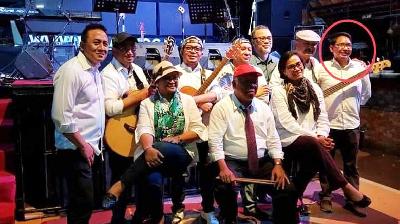
One of the suspects of the online gambling case is a regular in the ministers’ social circles, and active in the arts scene.

Former Communication and Informatics Minister Budi Arie Setiadi is implicated in an online gambling case. He allegedly met with representatives of gambling operators.

Efforts to block online gambling sites are proven futile, as many loopholes remain. Online gambling remains rampant in Jakarta.
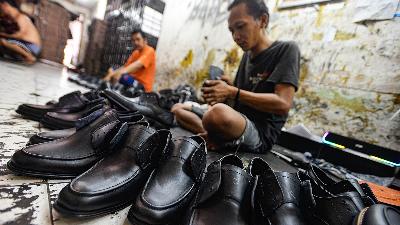
The disbursement of People’s Business Credit faces numerous challenges. Farmers and small business owners are vulnerable to loan sharks and middlemen.

We launch Tempo single brand, with news products integrated under one platform. Scores of new services will be offered.

The most significant factors behind Trump’s victory were Covid-19 and the Federal Reserve’s response. Life is likely to become harder for Americans—and for much of the rest of the world.

The future of BRIN is uncertain in the administration of Prabowo Subianto. It is caught up in a political deal with the PDI-P.

There are indications that the police are taking sides in local elections in a number of regions. This is the next setback for democracy after the presidential election.

There are many irregularities in relation to the detention of Tom Lembong. Without sufficient evidence of corruption, this case can be considered as politicization, and not enforcement, of the law.

Established to provide an opportunity to obtain loans, Danantara could sink Indonesia into a debt quagmire. Risk mitigation is key.

Minister of Higher Education, Science and Technology Satryo Soemantri Brodjonegoro explains BRIN’s position in the Prabowo government.
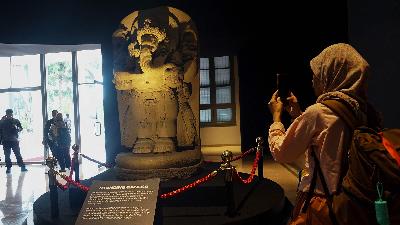
A collection of hundreds of cultural artifacts from the second phase of repatriation from the Netherlands is on display at the National Museum of Indonesia.
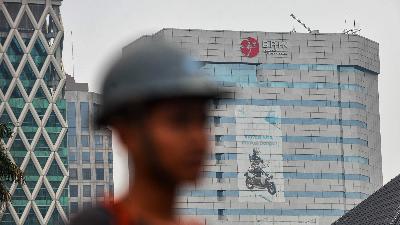
The position of BRIN remains uncertain under Prabowo Subianto’s administration. The restructuring of the research agency is hampered by political interests.
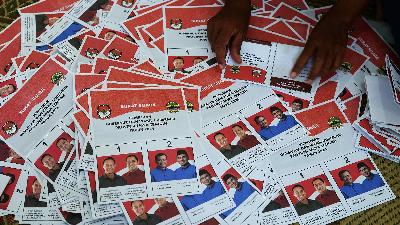
Jokowi and the police are helping to bring Ahmad Luthfi-Taj Yasin to victory in the Central Java Regional Head Election, allegedly pressuring village heads to show support.

Tom Lembong’s lawyer on the irregularities of his case.
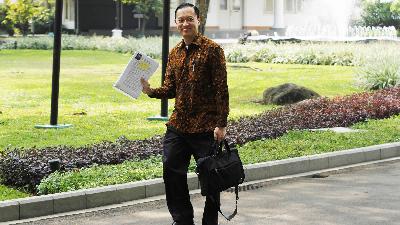
Tom Lembong owns assets worth Rp101 billion but does not own a house. He does not live with his wife and children in Jakarta.

The Supreme Audit Agency uncovered violations in sugar import practices during various periods of the Trade Ministry. Only Tom Lembong, the Trade Minister for 2015-2016, is indicted.
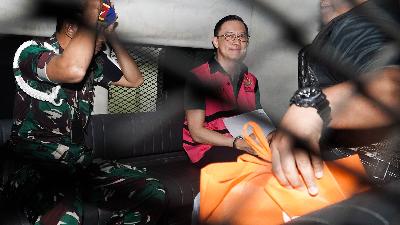
The Attorney General’s Office is still withholding the evidence in the sugar import case involving Tom Lembong. State losses remain unclear.

BI faces a dilemma over cutting rates amid the global volatility stirred by Trump’s victory.
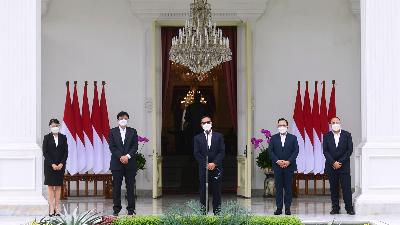
The Indonesia Investment Authority is set to merge with Danantara, but it still fails to optimize investments and faces ongoing issues with foreign investor confidence.

In the face of ambivalence, who is evil? It is those who choose greater evil or lesser evil.
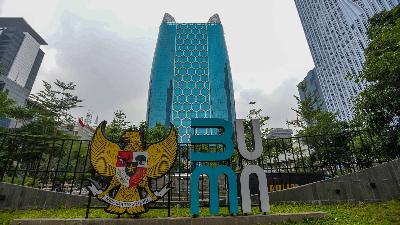
The plan for a super-holding for state-owned enterprises dates back to the New Order era. The SOEs Ministry will be replaced by a giant corporation.
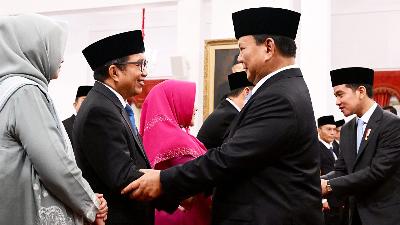
Prabowo Subianto is establishing BPI Danantara to manage state-owned enterprises. There are reportedly tug-of-wars and a number of obstacles in the process, including the obligation to revise laws.

The move by President Prabowo Subianto to save Sritex could well lead to corruption. A smart strategy is needed to rescue collapsing companies.

The food estate project in Central Kalimantan turned into an oil palm plantation. The government failed to learn from the mistakes of the past.

Ridwan Kamil should have realized from the start that the parties supporting him were not being sincere. The people will lose out.

With the Supreme Court’s judicial mafia, when one branch is lopped off, another 10 grow in its place. It needs to be comprehensively cleaned up.
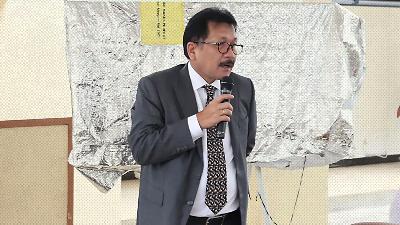
Judge bribery suspect Zarof Ricar was once a high-ranking Supreme Court official. He bankrolled a film about a judge.

The Supreme Court dismissed three judges suspected of accepting bribes in the Ronald Tannur case. This adversely impacts efforts to improve the judiciary.

The three judges who acquitted Ronald Tannur often reported for ethics violations. Their bank accounts show transactions amounting to the billions.
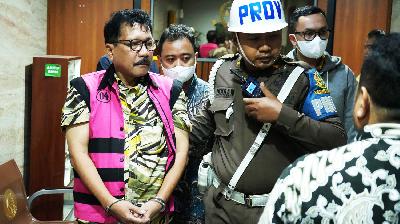
The Rp920 billion found in Zarof Ricar’s house is suspected of being related to arranging court case verdicts. The Corruption Eradication Commission once detected his corrupt exploits.
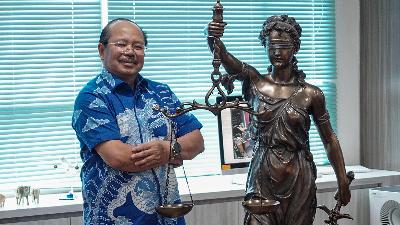
Judicial Commission Chair Amzulian Rifai on the corruption in judicial institution involving judges.
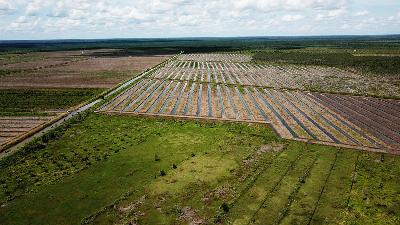
The food estate program, or rice field creation initiative in Central Kalimantan, was neglected and instead converted into oil palm plantations owned by private companies.

Ridwan Kamil’s electability remains stagnant in the Jakarta regional head election. His supporting parties are not actively campaigning for him, leaving him hoping for support from Prabowo and Jokowi.

Prabowo Subianto orders four ministers to rescue the bankrupt textile company Sritex. A potential bailout from the state is on the table.

Interviews with Industry Minister Agus Gumiwang Kartasasmita and Sritex President Commissioner Iwan Setiawan Lukminto on the company’s bailout.

After Sritex, other major textile companies are also collapsing. Incentives and support are needed to curb imported goods.

Capital outflow becomes increasingly clear at the outset of Prabowo’s administration. The large cabinet undermines investors’ confidence.

Kamala Harris champions women’s legal and political rights, countering Donald Trump’s machismo.

Prabowo Subianto is hoping to erase his sins in relation to the 1998 kidnappings. Gross human rights violations will not be a priority.

The obligation to obtain halal certification leads to higher economic costs and corruption. Labeling products that are non-halal would be more efficient.

Jokowi’s son-in-law, Bobby Nasution is caught up in alleged bribery involving a mining permit in North Maluku. He is accused of selling his influence.
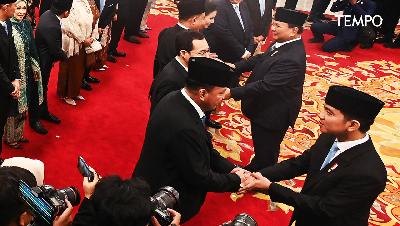
A number of problematic individuals are appointed to Prabowo Subianto’s cabinet. It will be difficult for the government to be effective in its first one or two years.
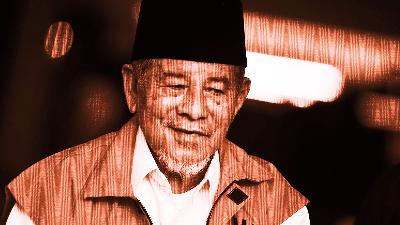
The term “Medan Block” emerged during the trial of former North Maluku Governor, Abdul Gani Kasuba. Medan Block is believed to refer to pre-allocated nickel mining concessions in Halmahera.
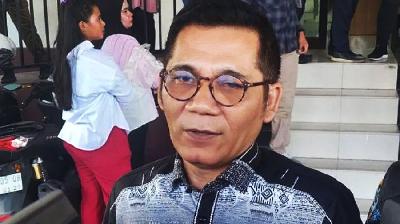
Former North Maluku Governor Abdul Gani Kasuba acknowledged meeting with Bobby Nasution but claimed he gained no advantage from it.
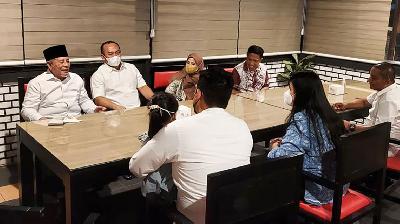
Bobby Nasution is suspected of managing the Medan Block nickel mine since 2021. He met with Abdul Gani Kasuba before becoming the Mayor of Medan.
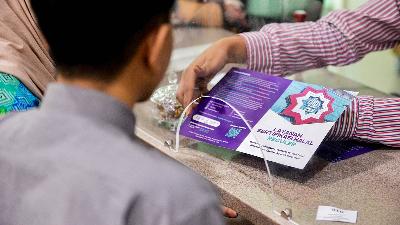
Entrepreneurs complain about the costly and complicated halal certification process. They must pay monthly fees for supervision.

Halal certification is slow due to inadequate supporting infrastructure. It has the potential to trigger a high-cost economy.

Entrepreneurs are pressured by the mandatory halal certification regulations. The costs associated with obtaining halal labels are considered expensive, and the procedures are complicated.
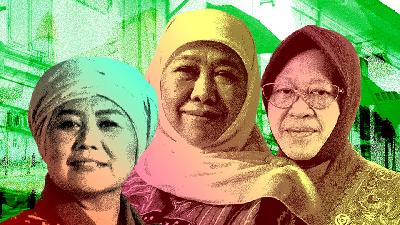
Three East Java gubernatorial candidates—Luluk, Khofifah, and Risma—talk about the competition in the 2024 regional head elections.
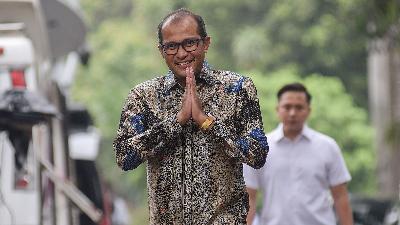
Prabowo Subianto appointed ministers and deputy ministers with problematic backgrounds in his cabinet. Several of them are closely associated with businessman Haji Isam.
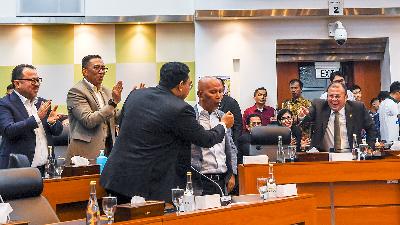
The PDI-P received the most positions as leaders of the DPR working bodies. Surya Paloh met with Bahlil Lahadalia to discuss the allocation of commission chairs.

The new ministries and agencies established by Prabowo Subianto cannot operate immediately. Some lack office space, have tight budgets, and are short on staff. The authority of the Haj and Umrah Organizing Agency even violates the law.

The rupiah is weakening amid the power transition, with global factors also exerting heavy pressure.

Driven by corporate demand, helicopter business opportunities continue to grow. Operators are increasingly expanding their fleets.

The phrase “human rights” was lost from Prabowo Subianto’s inauguration speech.
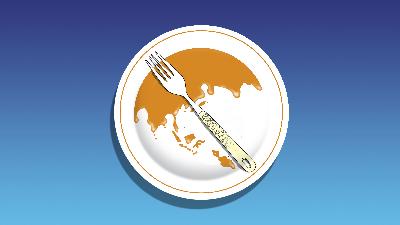
Food, like language, clothing, and customs, is a marker of our roots. Especially in the past.
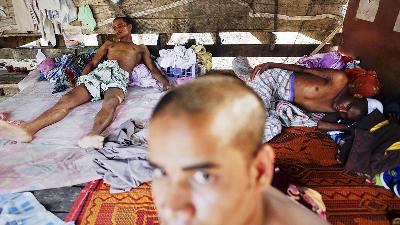
Rohingya refugees in Thailand, Malaysia, and the Philippines are treated differently than those in Indonesia.
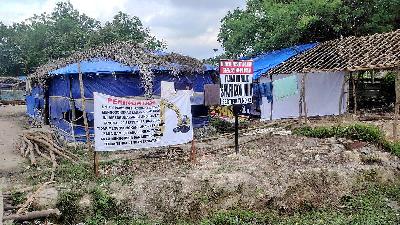
The Rohingya refugees living in Pekanbaru have more freedom to move around and reside in lodgings. Their children can also attend school.
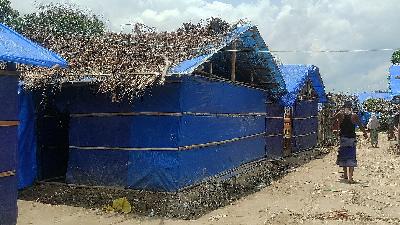
The increasingly overcrowded refugee camps demand improvements in the mechanisms for handling Rohingya refugees. The number of refugees continues to rise.

Several Rohingya refugees successfully built their careers in various fields. They continued to work and raised awareness about the plight of displaced Rohingya refugees.
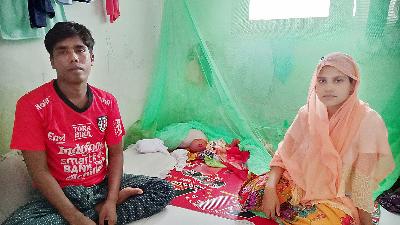
Rohingya refugees are still living in several inadequate temporary shelters in Aceh.

There are indications of problems with the IPO of Barito Renewables Energy. The stock exchange and capital markets authorities are neglecting their responsibilities.

There is an increasingly real threat to Indonesia’s biodiversity. It cannot be overcome through empty slogans at international forums.

The KPK should designate Sahbirin Noor a fugitive. There is a good chance the South Kalimantan Governor will go free.
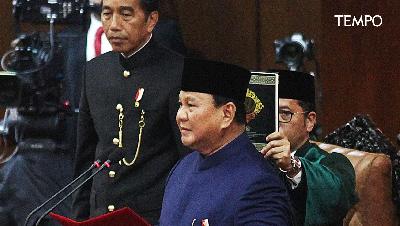
How did Prabowo Subianto decide on the composition of his cabinet? There are indications that several prospective ministers were proposed by tycoons.

Prabowo Subianto is inheriting an inefficient economy. Yet his new administration is likely to follow Jokowi’s economic model.
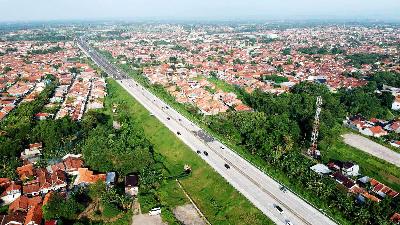
The Joko Widodo administration leaves a heavy burden for state-owned enterprises. Many projects result in big debts.
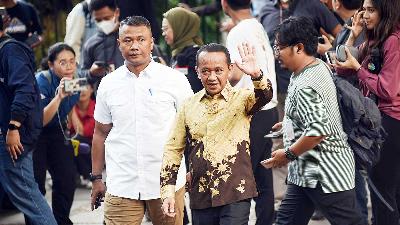
President Jokowi entrusted his confidants to join Prabowo’s cabinet. Several ‘volunteers’ also received positions.

Prabowo Subianto formed a large cabinet to accommodate the interests of parties, businessmen, and his supporters. Mining entrepreneur Haji Isam is suspected of proposing several ministerial candidates.
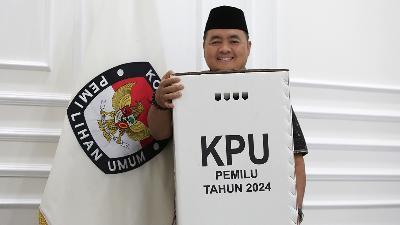
KPU Chair Mochammad Afifuddin on turbulence within his institution following the dismissal of Hasyim Asy’ari, and the Constitutional Court’s decision on the regional head elections.
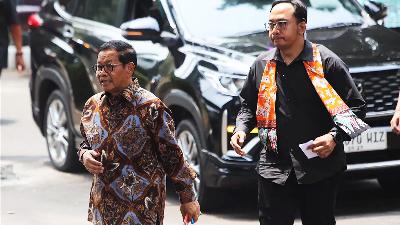
Megawati reportedly did not approve of PDI-P cadres entering Prabowo’s cabinet. She chose Pramono Anung to communicate with Prabowo.
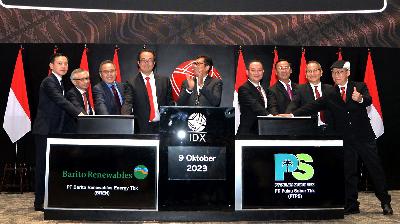
The Stock Exchange detects alleged violations in the IPO of Barito Renewables Energy. There are indications of maneuvering around public shareholding requirements.
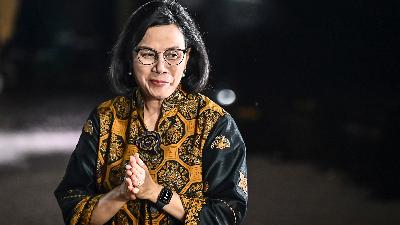
Sri Mulyani and several economic ministers from Jokowi join Prabowo’s cabinet, with encouragement from two former presidents.
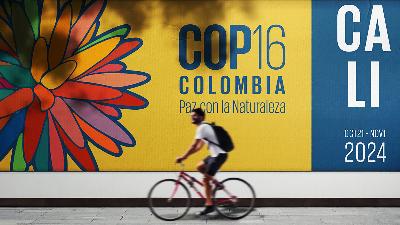
Indonesia’s delegation at COP16 CBD in Cali, Colombia, is not led by a minister. Biodiversity funding is at risk of not being agreed upon.

South Kalimantan Governor Sahbirin Noor is suspected of receiving commissions on three projects in the e-catalog. He has not been seen since being named a suspect.
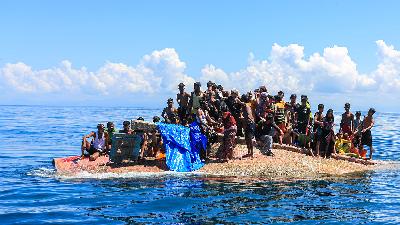
Uncertain future looms over Rohingya refugees in Indonesia. They are also struggling with various limitations.

Empathy is the key to happiness. We are happy when we help others, we are happy when we do good.

The KPK uncovered alleged embezzlement of the Taspen pension fund involving Sinarmas Sekuritas. The result of poor supervision by the OJK.

A number of policies from Minister Sakti Wahyu Trenggono are riddled with conflicts of interest. They benefit his son, Indra Trenggono.

There are indications that the selection of the KPK leadership for the 2024 to 2029 period is in breach of a Constitutional Court ruling. The process needs to be rerun.
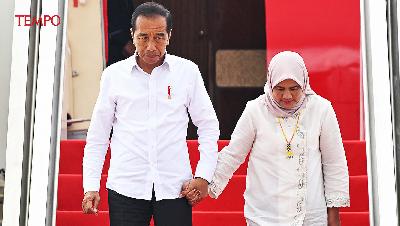
Jokowi is like a king reluctant to relinquish his crown. Nearing retirement, he is still trying to improve his image.

A reader’s letter suggests authorities seek ways for safe and efficient logistics transportation, in order to minimize traffic accidents.

Farwiza Farhan, the winner of the 2024 Ramon Magsaysay award talks about conservation of the Leuser Ecosystem in Aceh.
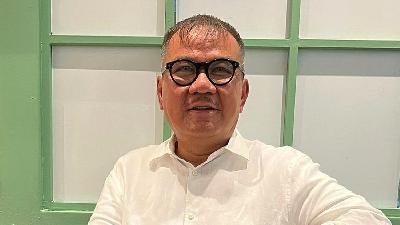
The KPK Leadership and Supervisory Board Selection Committee claimed to have followed procedures, and Jokowi reportedly did not intervene.
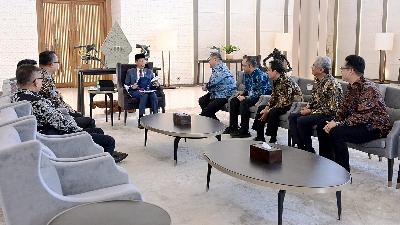
Various parties from the National Police Chief to the State Palace are accused of interfering in the KPK leadership candidates selection process. The candidates are divided into four clusters.

The KPK is investigating Taspen’s investment losses. Sinarmas is behind the transaction.
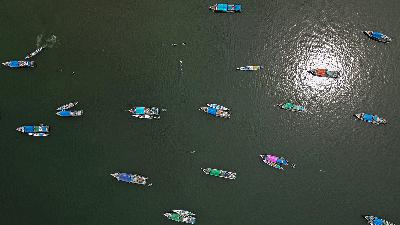
The family members of some ministers enter the fishery business. Other problems, such as the activity of illegal foreign vessels and the abuse of crew members, still prevail.
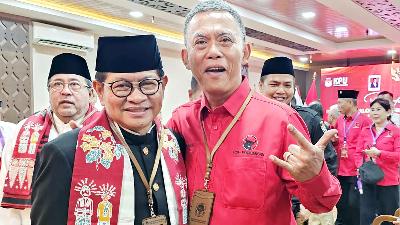
Two rivals in Jakarta’s upcoming regional elections are sharpening their winning strategies. There is a rift in the Indonesia Onward Coalition.

Articles on power wheeling prevent the legislation of a New and Renewable Energy Bill. State electricity company PLN’s unique position could be left precarious.

The government plans to liquidate Jiwasraya after the settlement of policyholder claims. A massive deficit still hangs over the company.
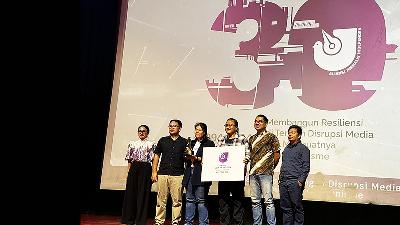
The Bocor Alus Politik podcast receives the Udin Award that we dedicate to our viewers and readers.
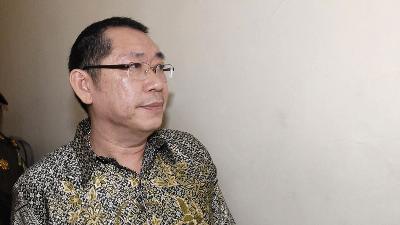
An interview with Jerry Hermawan Lo. He denies the allegation that he runs an online gambling scheme.

A series of deaths of Irrawaddy dolphins is a warning that this rare animal is increasingly under threat. Extinction is only a matter of time.

Megawati Soekarnoputri is upset over legal cases and election obstructions of her cadres. Political differences heighten her conflict with Jokowi.
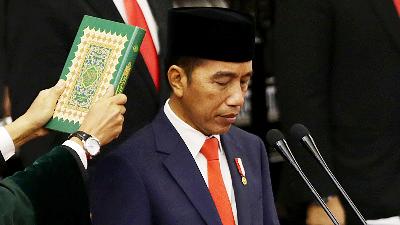
Tempo examined the achievements of Jokowi’s nine priority programs called Nawacita. There are numerous critical notes.

The guilty verdict for Karen Agustiawan shows that in Indonesia, even business decisions can easily lead to prosecution. This will have a long-term negative impact on our economy.

The corruption case at the Directorate-General of Railway fails to implicate any of the big names clearly mentioned in court. The KPK is at death’s door.
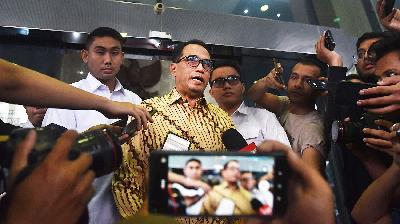
The investigation into the railway corruption case has yet to implicate high-ranking officials of the Transportation Ministry. The case ran aground at the hands of KPK investigators.

Muhammadiyah withdrew trillions of rupiah from Bank Syariah Indonesia. It was the accumulation of various problems, from operational matters to appointment of commissioners.

There were many irregularities with the sale of the assets relating to corruption in Jiwasraya. The auction winner received special treatment.
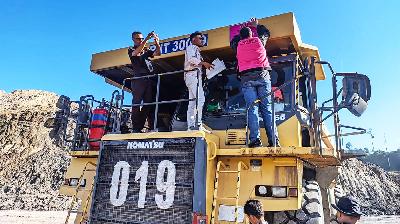
The auction value of the seized assets from the corruption case of Asuransi Jiwasraya is allegedly below the market price. It is linked to an ex-convict in a bribery case.
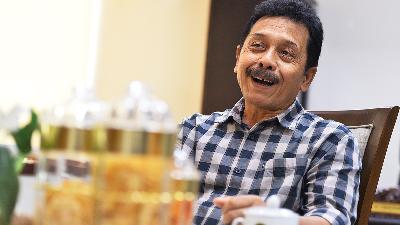
Constitutional Court’s Ethics Council Chair I Dewa Gede Palguna on his stance rejecting a revision to the Constitutional Court Law.

BI Rate hike fails to boost the rupiah. The markets await certainty on the new government’s fiscal policy direction.

Indonesian badminton men’s singles coach, Irwansyah, talks about the achievements in the 2024 All England.

Operators of the Jawa-1 steam-gas power plant are in a financial strain. Technical problems are slowing down the project’s development.
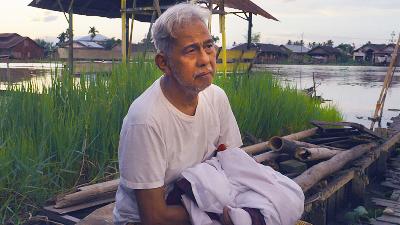
Arswendy Bening Swara gives a convincing performance as a wandering religious pilgrim.
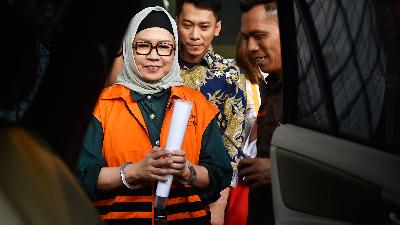
Former Pertamina CEO, Karen Agustiawan, files a lawsuit against the audit of PricewaterhouseCoopers. It does not change the Corruption Eradication Commission’s investigation.

The case of a fire breaking out at an ITSS nickel smelter is pointing towards procedural violations. The Coordinating Ministry for Maritime Affairs is using a criminal approach that targets workers, while the Ministry of Manpower is targeting corporate suspects.

A fire at the Tsingshan nickel smelter that killed 19 workers is believed to have been caused by carelessness. There was minimal oversight.
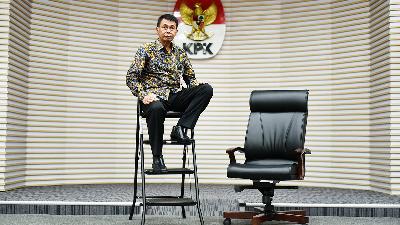
How will Nawawi Pomolango restore public trust in KPK?
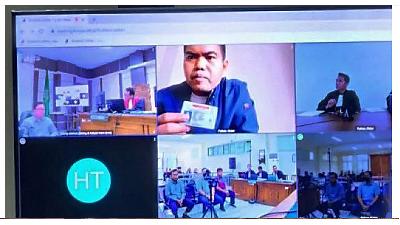
The KPK names businessman Muhammad Suryo as a suspect in the alleged bribery for the railway project. He is known to be a close associate of Insp. Gen. Karyoto.
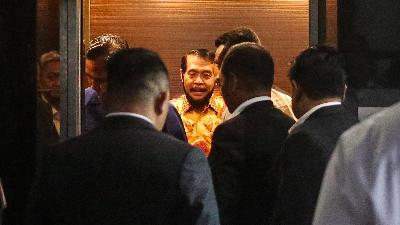
The Constitutional Court’s Ethics Council (MKMK) scrutinizes the role played by Constitutional Court Chief Justice Anwar Usman. The formation of the MKMK is being stalled.
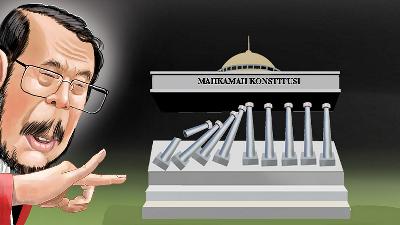
Constitutional Court Chief Justice Anwar Usman is reportedly maneuvering to lower the minimum age limit for presidential and vice-presidential candidates, paving the way for Gibran.
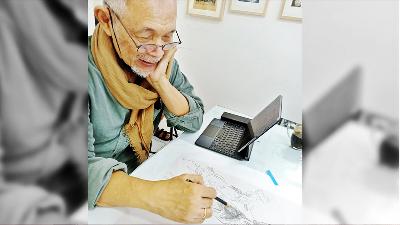
In the solo exhibition of Goenawan Mohamad, the drawings are honest and free. GM presents many solitary objects.

A number of cases show that carbon exchanges are prone to greenwashing. Carbon trading is considered a manipulative method.
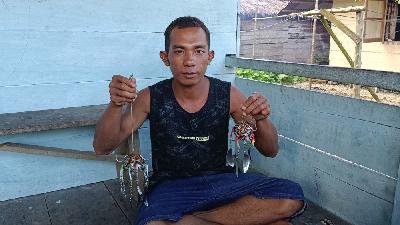
Awareness of how fishing practices can be harmful is improved in Mentawai Islands, but there are still obstacles.
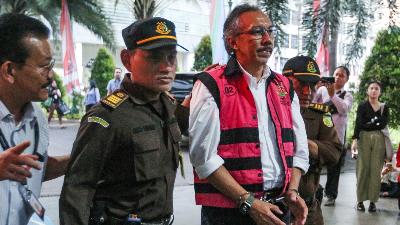
Former Director-General of Mineral and Coal, Ridwan Djamaluddin, is named as suspect in the Mandiodo Block nickel corruption case.

The support for Prabowo Subianto from Budiman Sudjatmiko and other 1998 activists is a form of political pragmatism. A disavowal of justice for the victims.

The inclusion of Jokowi volunteers in the cabinet could easily be exploited for the political interests of the president. It is moving further away from a cabinet of experts.
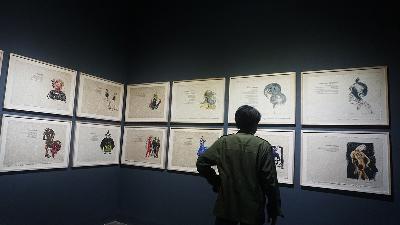
Goenawan Mohamad exhibits works depicting ghosts he encountered in a collective exhibition in Art Jog 2023.

Greenwashing practices are increasing in the finance industry. Indonesia does not yet have regulations to counter these deceptive actions.
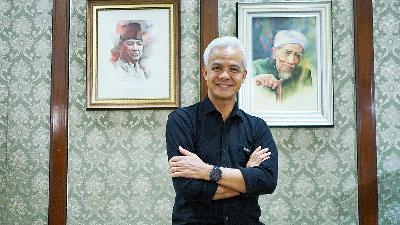
PDI-P’s presidential nominee Ganjar Pranowo talks candidly about the support he receives from Jokowi and Megawati Soekarnoputri.

Goenawan Mohamad’s gracious farewell from Sidelines.
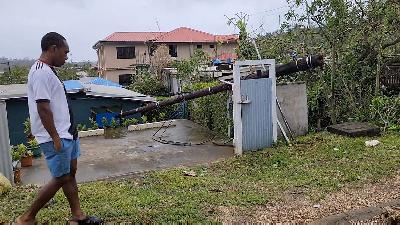
Vanuatu's resolution to the United Nations on the obligation of states to preserve the climate will pave the way for ecocide to be brought to the International Criminal Court.
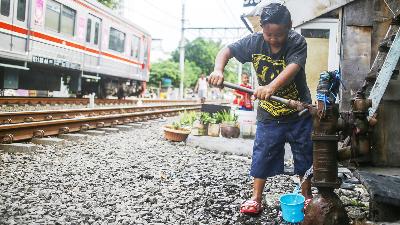
Excessive extraction of groundwater has been the greatest contributor to Jakarta’s land subsidence. The construction of drinking water pipes will be accelerated.
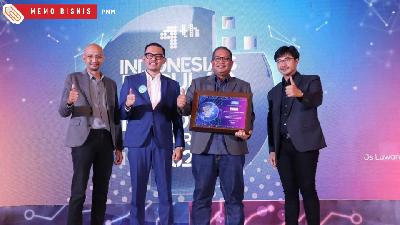
This award will motivate PNM to continue to give the best to Indonesia. #Infotempo
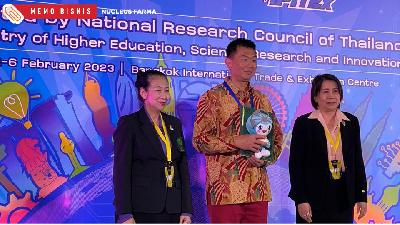
Nucleus Farma won five awards.
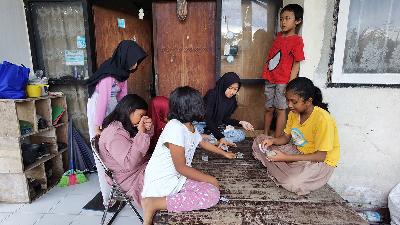
Ahmadi children suffer from persecution, but hold no grudges. They want to grow up to become doctors and pilots.
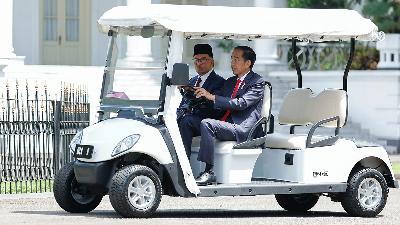
Malaysia Prime Minister Anwar Ibrahim promises to protect Indonesian migrant workers.
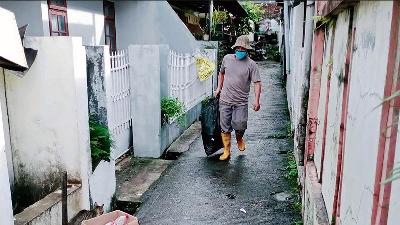
Bandung and Bali are determined to become zero waste cities. Their journey begins by sorting garbage from the source.
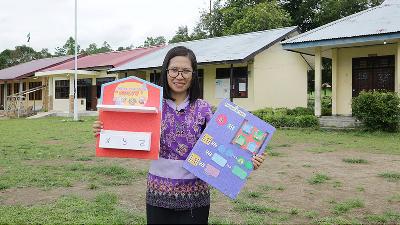
A mathematics teacher in Manokwari, Krisye Kloudia Adimin, transforms the school’s teaching method and interaction with students after joining the Guru Penggerak Program.
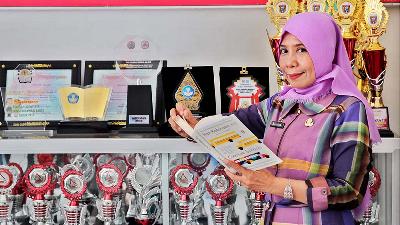
Erniwati, Principal of the State Elementary School 66 in Pekkabata, West Sulawesi, holds inspirational class events at her school. This participant in the Guru Penggerak program, known for her punctuality, makes many breakthroughs through her works.
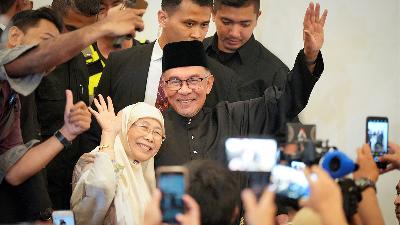
The King of Malaysia finally sworn in Anwar Ibrahim as the new prime minister while the National Alliance decides to become opposition.
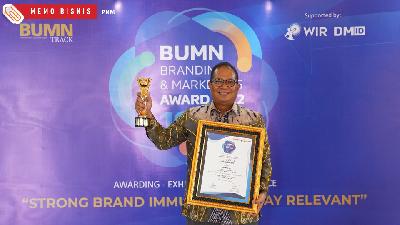
This award becomes a new standard for PNM to develop and keep growing. #Infotempo

The awards prove that PNM has succeeded in building brand awareness while still paying attention to brand equity. #Infotempo
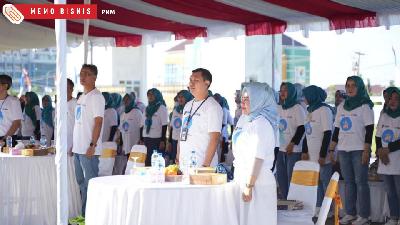
This campaign was attended by 500 participants, consisting of 250 PNM Mekaar customers and the public, especially underprivileged women.#InfoTempo
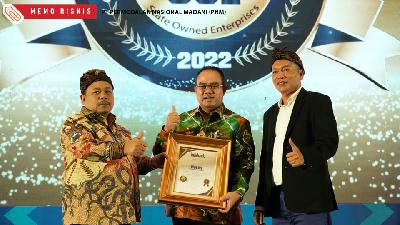
The award winners at the annual event were assessed based on the rating results of the Infobank Research Bureau with the criteria for business growth and important financial ratios. #Infotempo
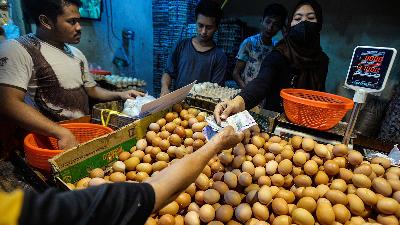
The rise in food and fuel prices is out of control. The Russia-Ukraine war triggers the inflation.

The marriage of Anwar Usman to the sister of President Joko Widodo could damage the independence and quality of the rulings issued by the Constitutional Court. This is at odds with the Judicial Authority Law.

Letters: from the Pelalawan forest to handling an ankle injury.

The ethical violations by doctor Terawan Agus Putranto are plain for all to see. The Indonesian Doctors Association made the right decision.

Mud from nickel mining and processing is reportedly polluting the waters around Kawasi, Obi Island, North Maluku. Tailing waste is also being dumped into the sea.
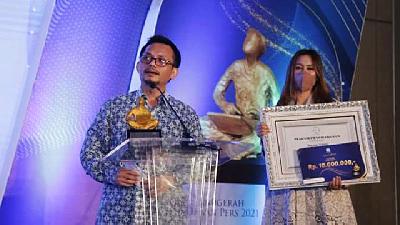
The Press Council gives its Award 2021 to Tempo in the printed media category. This award is for you, loyal readers.
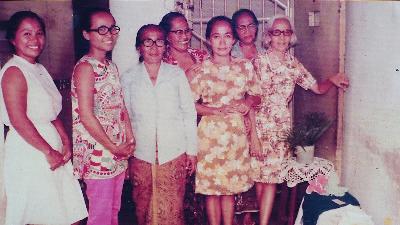
Tempo again presents a special report as an effort to verify the historical claims manufactured by Suharto’s regime surrounding the September 30, 1965 tragedy. This time, we wish to present the life, activism, and ideas of Gerwani Chair, Umi Sardjono.
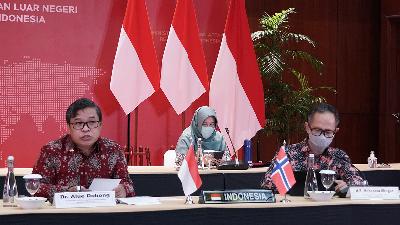
Norway has not yet released US$56 million to Indonesia under the REDD+ arrangement. Negotiators from both countries are still deliberating the matter.

There is no longer any need for the government to be responsible for research into the Nusantara vaccine being promoted by former Minister of Health Terawan Agus Putranto. None of the claims about it have been tested clinically.
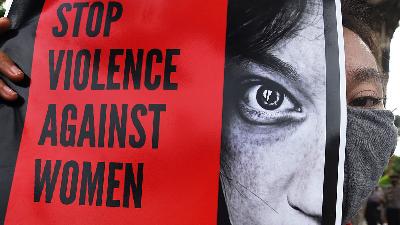
THE Sexual Violence Eradication Bill returned to the national legislation limelight on 23 March. This is the fruit of the labor of women’s rights activists who have been tireless in realizing legislation to protect women from sexual violence. But the struggle is far from over. Since it was first proposed by the National Commission on Violence against Women in 2012, the draft regulation has been in limbo. After entering the national legislation program in 2016, the bill remained unpassed. Women’s rights activists have gone through a winding road to convince the House of Representatives and the government so that the draft regulation can be immediately discussed and passed.

The government removed the ash resulting from burning coal in power plants from the category of hazardous and toxic waste. The industry sector is not yet ready to exploit it.

The ruling, or fatwa, from the Indonesian Ulemas Council (MUI) that concludes the AstraZeneca vaccine haram—forbidden—should not be a consideration in the Covid-19 vaccination program. Matters of health need medical and scientific considerations, not fatwas.
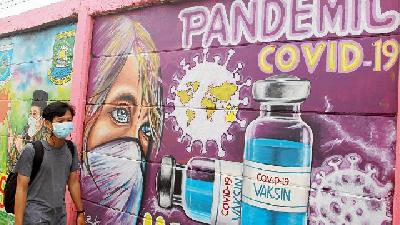
Terawan Agus Putranto is promoting the Nusantara vaccine to a number of officials. The National Institute of Health Research and Development does not fully supported research plans for this dendritic-cell vaccine. Terawan is also attaching researchers’ names without their consent.
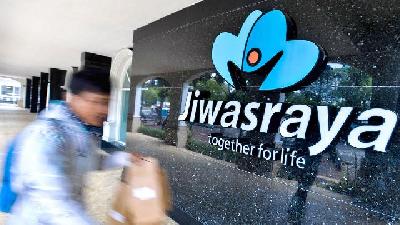
The Attorney General's Office still has not named any new suspect in the Asuransi Jiwasraya investment funds scandal. For quite a while now, the Financial Services Authority has detected foul play in Jiwasraya's asset placement, but no firm action was ever taken.

The New and Renewable Energy Bill must accelerate the endeavor to abandon fossil-based energy sources such as coal. As a precondition, the mechanism for purchasing electricity must be revised.

The House of Representatives is preparing to fast-track the discussions on the New and Renewable Energy Bill. Some new ideas are not accommodated.
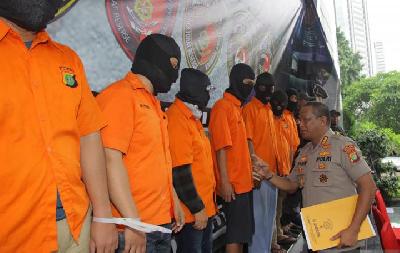
Cases of illegal SIM card swaps ending in bank account theft have increased in the past year. Allegedly bank employees are involved.
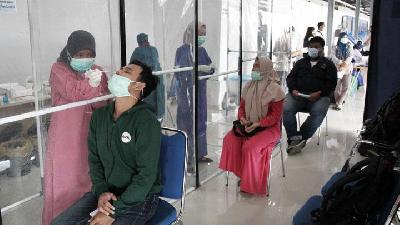
Due to the government limiting the level of covid testing, people in several regions are having difficulty accessing swab tests.

The government injected Rp22 trillion into Jiwasraya by establishing a new insurance company. This is the best of all the possible schemes.

Goenawan Mohamad

The pollution of the Bengawan Solo River continues without any satisfactory solution. Serious measures are needed against the companies that dispose waste.
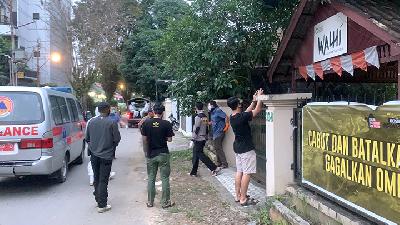
Swab tests were conducted under irregular circumstances on activists in East Kalimantan. Some think it was a ruse to halt their advocacy activities.
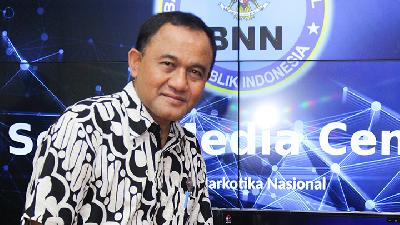
Crystal methamphetamine from Myanmar is often smuggled in by Taiwanese fishermen. National Narcotics Agency (BNN) has identified the ships used for this purpose since 2017, but their names are frequently changed to cover the traffickers’ tracks.
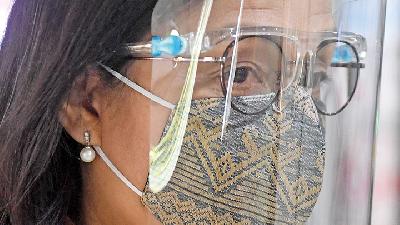
As the Covid-19 pandemic continues to restrict major public activities, the government predicts the national economic growth to take a nose dive to minus 4.3 percent in the second quarter. “For the most part, the drop is attributed to a sharp decline in consumer spending,” said Finance Minister Sri Mulyani Indrawati, 57, during a special interview with Tempo on July 17.
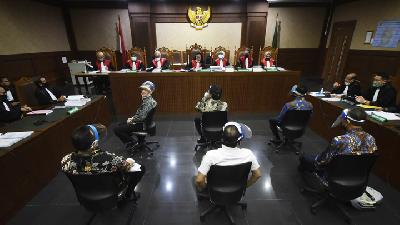
Ties between players in a suspected corruption case at Jiwasraya are becoming clearer. The involvement of investment managers led investigators to the Financial Services Authority and the Indonesian Stock Exchange.
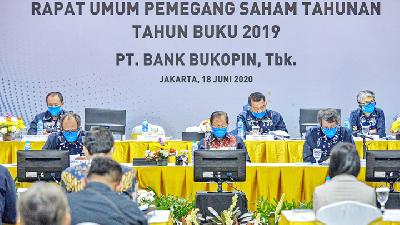
Bosowa Corporation is attempting to maintain control over Bank Bukopin, which is one step away from being handed over to Kookmin Bank. Due to Bank Bukopin’s worsening liquidity, it has become increasingly urgent to inject more capital into the bank. Bukopin’s chronic illness came to the surface due to loan issues with companies affiliated with the Kalla group and Bosowa.

Four species of primates endemic to Mentawai Islands are now endangered. Most of their populations are found just outside of Siberut National Park, in what is designated as production forest area. This report is supported by the Rainforest Journalism Fund under partnership with the Pulitzer Center.
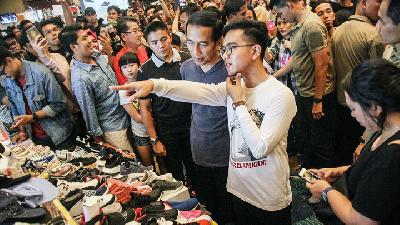
Following in his father’s footsteps, Joko Widodo’s son Gibran Rakabuming Raka is one step away from becoming Solo’s mayor. Although he received rejection from the Solo branch of the Indonesian Democratic Party of Struggle (PDI-P), that chose to support another candidate, Gibran has the support of PDI-P’s central board. Other parties have given their support after some lobbying from the Palace. Gibran also has the full support of his family.

Four species of primates endemic to Mentawai Islands are now endangered. Most of their populations are found just outside of Siberut National Park, in what is designated as production forest area. This report is supported by the Rainforest Journalism Fund under partnership with the Pulitzer Center.
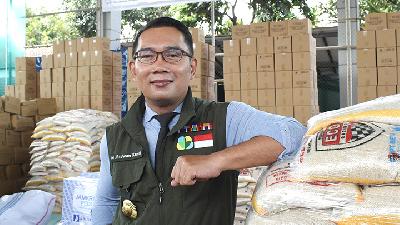
West Java Governor Mochamad Ridwan Kamil has ordered large-scale social restrictions—or PSBB as widely known—across the entire West Java region starting May 6 following the successful implementation of the same measures in Bogor-Depok-Bekasi and Greater Bandung.
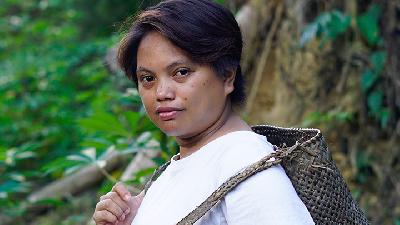
Sri Tiawati was adamant to build a school for her tribe in Semeriot village. She was once embarrassed to have been a native of Dayak Punan.
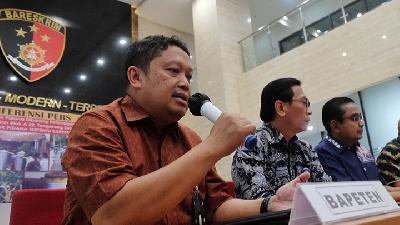
After unearthing cesium-137 (Cs-137) nuclear waste in an empty lot in the Batan Indah housing estate, Serpong, South Tangerang, Banten, the Nuclear Energy Regulatory Agency (Bapeten) and police discovered illegal radioactive material in a house on Block A-22 in the same complex. The house owner is Suhaedi Muhammad, a senior officer at the National Nuclear Energy Agency (Batan).

I WAS a participant with the highest rating in the #maudigaransimurah program of Bukalapak carried out on October 7-December 31, 2019.
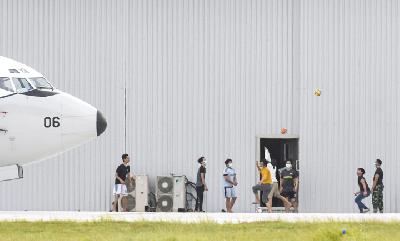
Indonesians in China are taking every possible way to return to mother land. It is a journey of endless airport checks.

Using the right to institute an inquiry could cloud the Jiwasraya issue. Maintaining investor trust is more important.

Corruption Eradication Commission (KPK) leaders are only half-heartedly pursuing the alleged bribery of General Elections Commission (KPU) member, Wahyu Setiawan, who was apprehended on January 8.
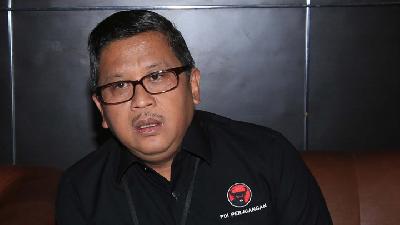
After General Elections Commission (KPU) commissioner, Wahyu Setiawan, was reportedly arrested, Indonesian Democratic Party of Struggle (PDI-P) Secretary-General, Hasto Kristiyanto, ‘disappeared’ almost one full day.

The Jiwasraya scandal is a reflection of how atrocious monitoring of financial services in this country. Investor trust in financial markets could rapidly dissipate.

The torrential downpour which lasted for over five hours as New Year’s Day of 2020 was ushered in caused flooding across most of Jakarta, Bogor, Depok, Tangerang, and Bekasi.

People nowadays can accuse, fault-find and convey any public harsh criticism without need for clarification.

The state-owned enterprises ministry is to implement its scheme for rescuing Jiwasraya. This will become a bad precedent.
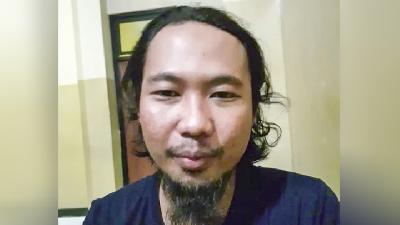
Fazri Pahlawan aka Abu Zee Ghuroba, Emir of the Bekasi Jamaah Ansharud Daulah:
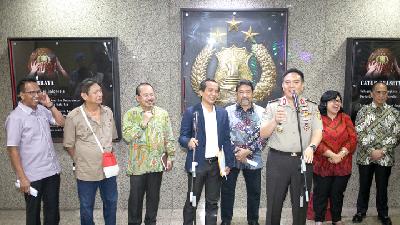
Before the acid attack, a police official warned Novel of a potential terror attack on him. Novel once met with National Police Chief Gen. Tito Karnavian.
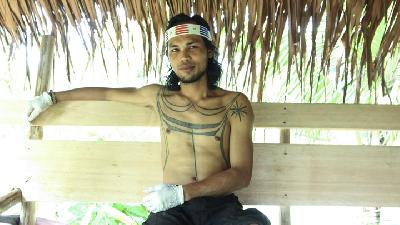
Young Mentawai tattoo artists are attempting to revive the region’s dying tattoo art. The group documents traditional motifs and gives away free tattoos.

WIFE of former president Susilo Bambang Yudhoyono, Kristiani Herrawati or Ani Yudhoyono, passed away at Singapore’s National University Hospital on Saturday, June 1. Ani, 66, died after battling leukemia.

The dwarf, the bastard, the eunuch with his falsetto…they are not strong impeccable characters like Diana, the Amazonian with a perfect figure in Wonder Woman, or Clark Kent, the handsome, polite, awkward man who occasionally transforms into Superman.

Disobedience has a price. The cost of civility is enormous.
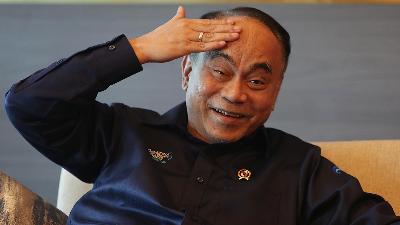
Tempo’s interview with Minister of Communication and Informatics Budi Arie Setiadi about Jokowi’s campaign before the end of his tenure.

As President Jokowi's term neared its end, instructions were given to promote the government's achievements, and billions of rupiah in contracts were offered to the media.
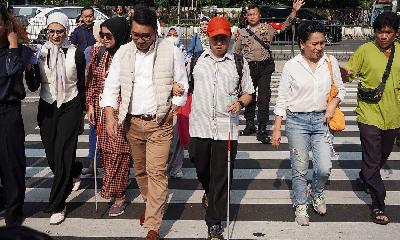
Jakarta governor and deputy governor candidates promise improvements in inclusive public transportation.
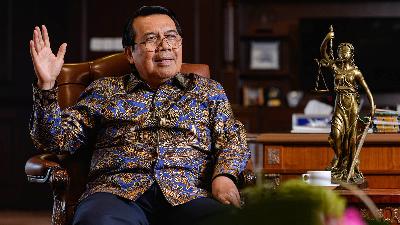
Supreme Court Chief Justice Muhammad Syarifuddin uses artificial intelligence to handle cases. Case brokers continue to be a threat.
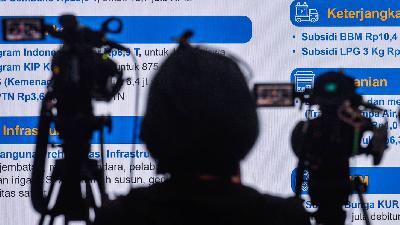
Media companies are experiencing upheaval due to the rapid changes in the business landscape. The industry is moving towards a new equilibrium.

Using a variety of pretexts, the political parties replace elected legislative candidates. This is a betrayal of the people’s choice.
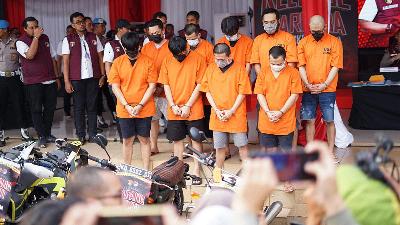
Hendra Sabarudin’s drug network distributed methamphetamine from Tarakan prison starting in 2017, allegedly aided by police and prison guards.

The government plans to dredge 17.6 billion cubic meters of sea sand and sediment, altering the landscape and destroying marine life.
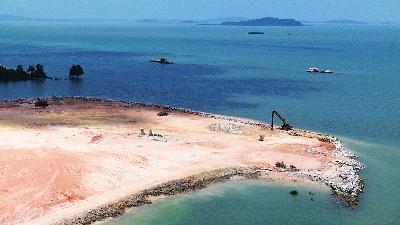
The government designated a number of areas as zones for cleaning sediment and sea sand.

Anindya Bakrie ousts Arsjad Rasjid from the position of General Chair of the Indonesian Chamber of Commerce and Industry (Kadin). The Palace’s support shifted.
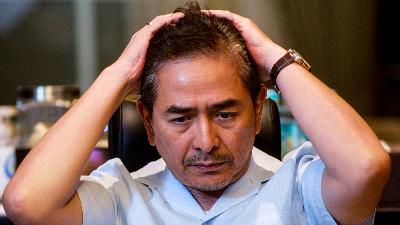
Anindya Bakrie ousted Arsjad Rasjid as the Chair of the Indonesian Chamber of Commerce and Industry (Kadin). The organization is becoming like a political party and enjoys large funds coming in from overseas.

Gubernatorial candidates are trying to win over the votes of Anies Baswedan supporters in the Jakarta regional election. Jokowi reportedly shifted his support.

Pramono Anung and Ridwan Kamil shed light on the dynamics surrounding their appointments as Jakarta gubernatorial candidates.
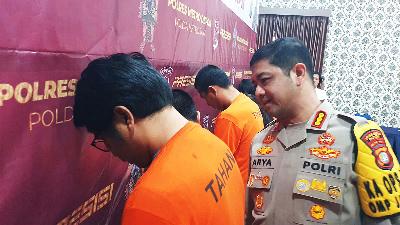
Police uncover baby trafficking syndicate operating in Java-Bali since 2023. Five babies were already sold.
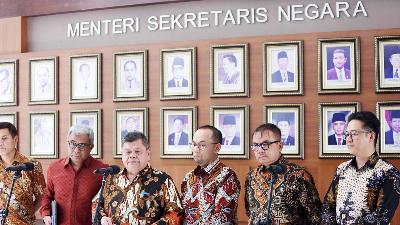
News summary on the conflict of interest of KPK leadership candidates and 44 ministries in Prabowo’s government.
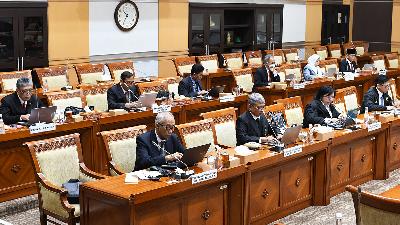
Commission III of the House of Representatives rejected all the Supreme Court judge candidates proposed by the Judicial Commission. The rejection allegedly was due to their favored candidate failed to pass.
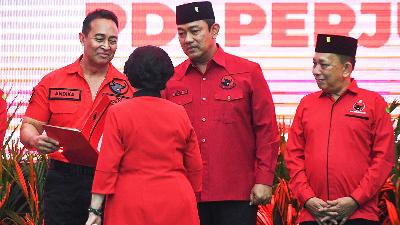
The Indonesian Democratic Party of Struggle (PDIP) strives to counter candidates supported by the Palace. It is an early projection for the 2029 General Elections.
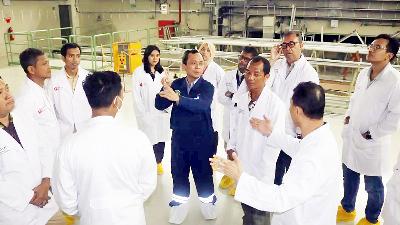
BRIN is designing the Peluit-40 nuclear reactor to replace diesel power plants, claiming it to be safer.
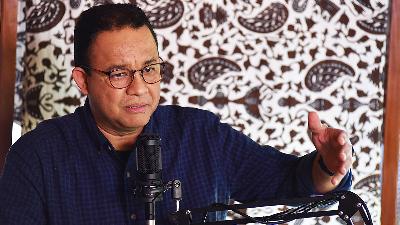
An exclusive Tempo interview with Anies Baswedan regarding his chances to run in the Jakarta regional head election.

Jokowi and Prabowo’s coalition are maneuvering to thwart Anies Baswedan’s candidacy in the Jakarta regional head election. Cabinet posts are being offered as inducements.

Tommy Hermawan Lo’s name emerges following the mention of Mr. T in online gambling that involves human trafficking case. He is a director at a casino management company.
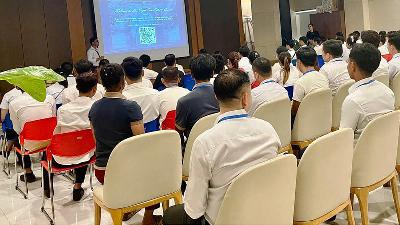
Victims of human trafficking for online gambling and scamming in Cambodia claimed of being forced to work 12-hour shifts and being beaten. Recruitment is still ongoing.
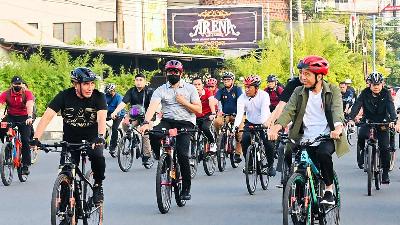
The battle in the presidential election is set to continue in regional head elections. The PDI-P is determined to challenge President Joko Widodo’s candidates.
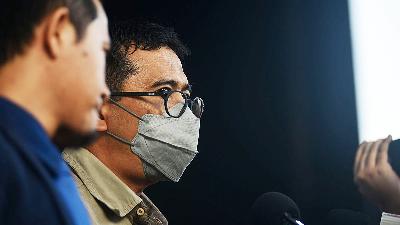
Personal protective equipment corruption suspect, Budi Sylvana, denied inflicting up to Rp300 billion of losses to the state. He revealed the roles of other officials in the case.
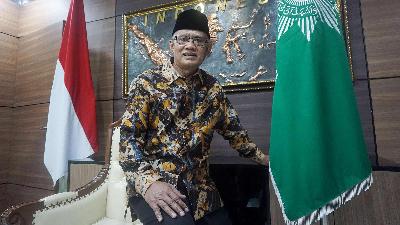
Muhammadiyah follows Nahdlatul Ulama’s step to accept mining concession offer from the government. Muhammadiyah General Chair Haedar Nashir explains about it.
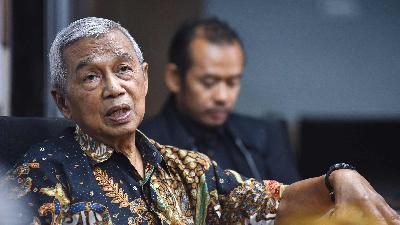
Muhammadiyah accepts the government’s mining concession offer. Many members are against it. Busyro Muqoddas, Chair of Muhammadiyah’s Law and Human Rights Council explains.

Muhammadiyah cadres and administrators are divided in their response to the mining concession. There are whispers from the government and the entrepreneurs.

Retno Marsudi dismissed the idea that the government is merely meddling foreign affairs. She emphasized that Indonesia is a trusted partner on the international stage.
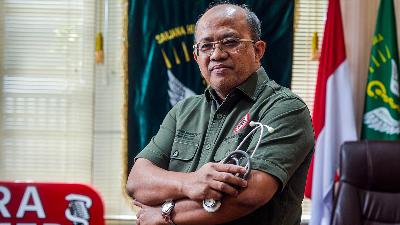
Chair of IDI, Mohammad Adib Khumaidi, discusses the polemic over the plan to allow foreign doctors to practice in Indonesia. He emphasizes stringent regulations are necessary.

Communication and Informatics Minister Budi Arie explains the cyberattack on the Temporary National Data Center. He dismisses allegations of negligence.

Infinite Earth responds regarding the revocation of Rimba Raya Conservation’s ecosystem restoration permit.

There will be a wave of layoffs at Tokopedia as a result of inefficient practices. This is the result of government policy rife with conflicts of interest.
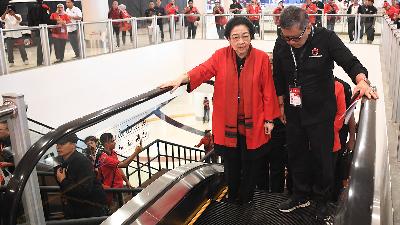
The PDI-P is preparing to replace Hasto Kristiyanto after he was questioned by the KPK in the Harun Masiku case. They are wary of the Palace’s interference.
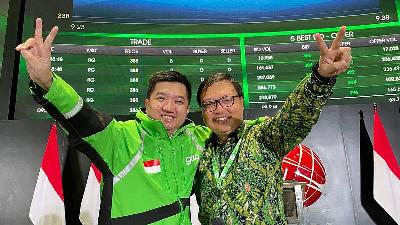
The founders of GoTo and Tokopedia sold their shares. New investors now have control of ownership.

Tokopedia made significant cuts in its workforce following its business consolidation with TikTok. A consequence of inefficient business operation.
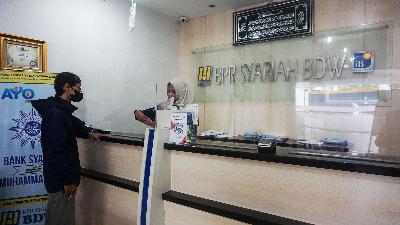
Muhammadiyah’s business networks cover various sectors, from education to financial services. It seeks to create a closed economic ecosystem.
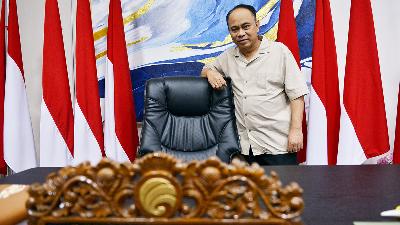
Communication and Informatics Minister Budi Arie Setiadi talks about the polemic over the planned revision of the Broadcasting Law and the Starlink Internet service.
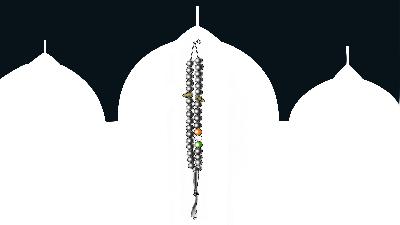
Narendra Modi is likely to serve his third term as the Prime Minister of India. His campaigns are based on populism and religion.
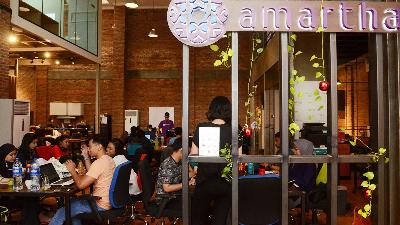
The fintech lending business is increasingly losing steam. Returns continue to decline while fund owners are opting for other investment portfolios.
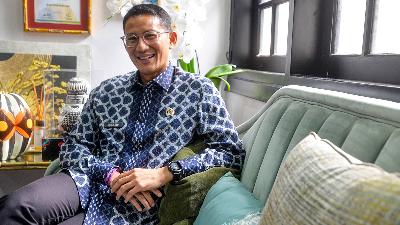
Tourism and Creative Economy Minister Sandiaga Salahuddin Uno assures that the tourism fee will not be imposed on plane tickets.
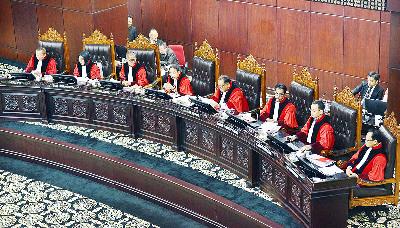
The Constitutional Court rejected lawsuits disputing the results of the 2024 presidential election. The option of disqualifying Gibran was discussed in a meeting of the judges.
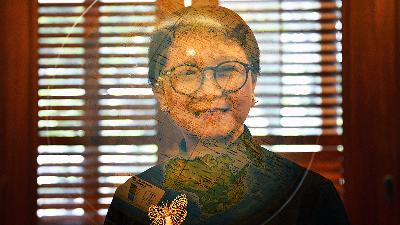
Foreign Affairs Minister Retno Marsudi explains the Gaza war and the Iran-Israel conflict with its impact on Indonesia’s economy.
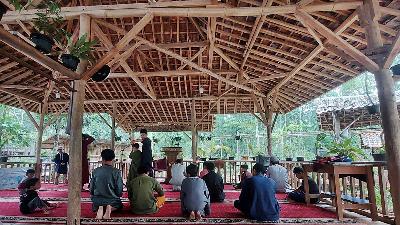
Islamic boarding schools (pesantren) cannot be closed even if they do not have a license from the government. There is no protection from the Ministry of Religious Affairs if legal problems arise.
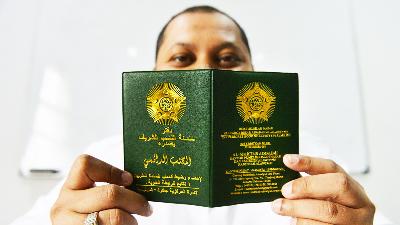
The Rabithah Alawiyah organization is in charge of recording and preserving the line of descent of the Alawiyyin in Indonesia. Seven books from Yemen serve as their guide.
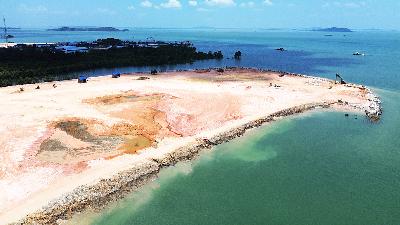
Several companies are applying for permits to utilize sediment, including sea sand. Large corporations use landfills for land reclamation areas.

Indigenous people are taking legal action against the President and the DPR for delaying deliberations of a bill. It has taken second place to the interests of investors.
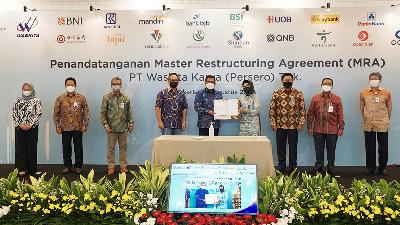
State banks stop distributing loans to state construction companies. Government assignment projects are burdening banks.

The government opens the option of switching energy subsidies for the free lunch program. This threatens poor households.

The government issues a regulation to develop the game industry. There will be a special funding agency.
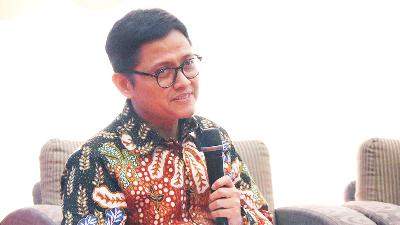
Discussions of the Asset Recovery Draft Law is stagnating in the DPR. It is key to preventing money laundering.

TikTok Shop’s acquisition of Tokopedia changes the Indonesian business map. It is not clear how small and medium enterprises will be protected.
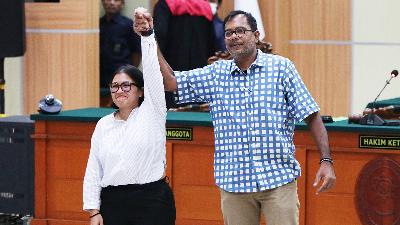
The prosecutor persists in filing a cassation against the acquittal of Haris Azhar and Fatia Maulidiyanti. It is a threat to the freedom of expression.

GoTo CEO Patrick Waluyo reveals the story behind the selling of Tokopedia shares to TikTok. How much profit did GoTo get?

The integration of TikTok Shop with Tokopedia will reinforce GoTo’s business. Indonesia’s e-commerce competition landscape is changing.

The presidential and vice-presidential candidates are relying entirely on gimmicks to exploit the emotions of the people. This moves the campaign away from substantive discussions.

Do the presidential candidates succeed in attracting young voters with social media gimmicks?

Budiman Sudjatmiko persuades other activists to support Prabowo Subianto. He claims he is not motivated by money.
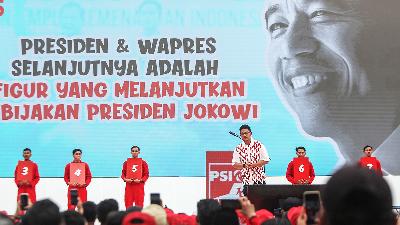
How does the Indonesian Solidarity Party get its funding? Is the aid from conglomerate bosses like Djarum’s owner true?

Presidential Chief of Staff Moeldoko is writing regarding his alleged interference in electric vehicle policy over Wuling’s SNI certification.

Post-Firli Bahuri, the Corruption Eradication Commission (KPK) is still walking backward toward its grave. A radical reform is needed.

The presidential candidates’ campaign teams are an illustration of the type of government they would form if elected. Businesspeople have a central role.
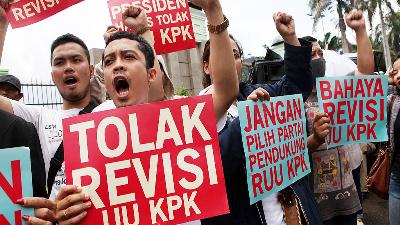
The Corruption Eradication Commission is no longer independent ever since it became part of the executive body. The fruit of the revised KPK Law.
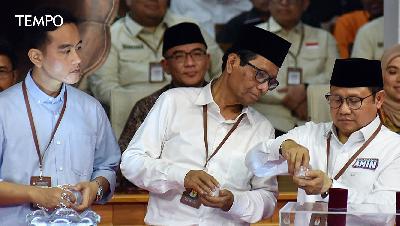
In Indonesia, presidential candidate debates are planned as bogus performances. There is no in-depth discussion of the issues.

Yet again, a member of the Supreme Audit Agency is involved in corruption. The system for selecting these state auditors is very poor.
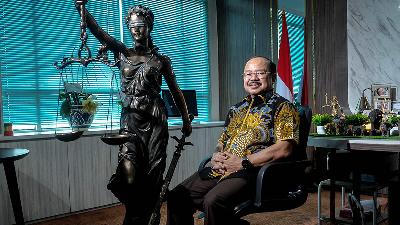
Judicial Commission Chairman Amzulian Rifai explains the boundaries of his authority in dealing with judges, and the Judicial Commission Bill.
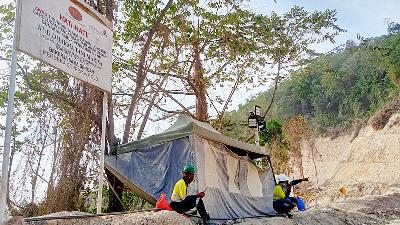
Sandiaga Uno and Garibaldi Thohir’s company is in conflict with local miners. The amount of compensation is considered inadequate.

Having no democratic legitimacy, Gibran Rakabuming Raka must withdraw his candidacy for the vice-presidency.

Tempo's special interview with MKMK Chairman Jimly Asshiddiqie regarding the dismissal of Anwar Usman as Chief Justice of the Constitutional Court.
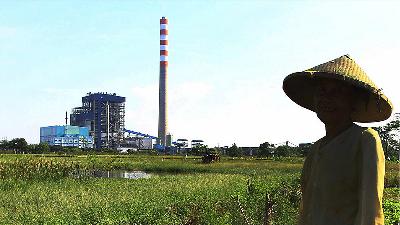
The program to put coal-fired power plants (PLTU) into early retirement is hampered by funding problems. As grants are stuck, the state budget must be disbursed.

Nepotism is the close relative of corruption and dictatorship. The Indonesian Independence Proclamation places nepotism as a threat to independence.
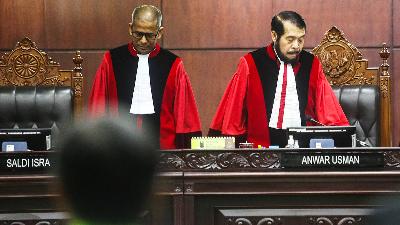
The Constitutional Court reportedly already made a decision in favor of a lawsuit regarding the minimum age requirement for presidential and vice-presidential candidates. The issue is rife with conflicts of interest.

Carbon trading is simply a way to mitigate climate change. The main aims are the energy transition and environmental protection.
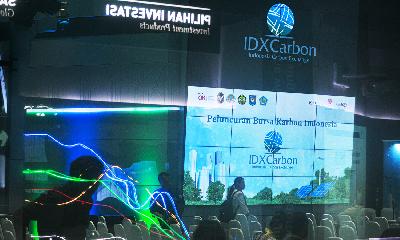
The Indonesian Stock Exchange established four carbon trading mechanisms. There were 27 transactions in three schemes in the initial sale.

Presidential candidates’ supporters are creating unfavorable atmosphere in the build-up to the 2024 general elections with them more inclined to speak about rivals’ weaknesses than promoting their champions’ profiles.
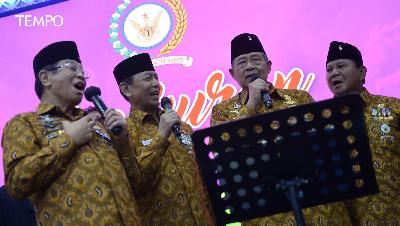
The 2024 presidential candidates are competing to garner support from retired generals. This perpetuates the militaristic nature of Indonesian politics.

The plan from the OJK to introduce carbon units as securities could lead to problems. Carbon trading no longer means a reduction in emissions.

The three soldiers who allegedly killed a civilian should be tried in a criminal court. The Military Courts Law needs to be revised.
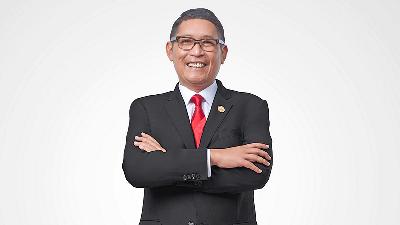
The OJK regulates carbon exchanges as a securities trading platform. How will the OJK prevent greenwashing in the carbon exchange?

The news in our media is problematic. Why is that?
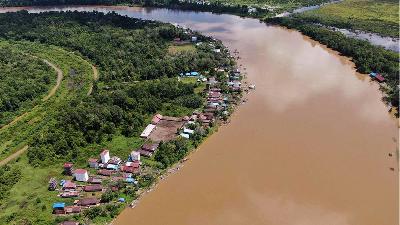
Voluntary carbon trading has stopped since 2021, due to upside down policies.
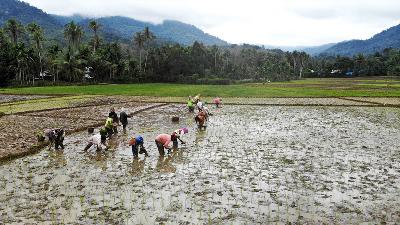
Individuals and companies are already implementing carbon trading in the voluntary market. But no price standard has been set.
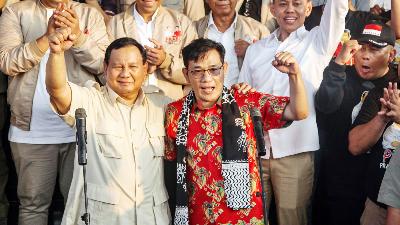
News summary, from the dismissal on Budiman Sudjatmiko to Food Estate.
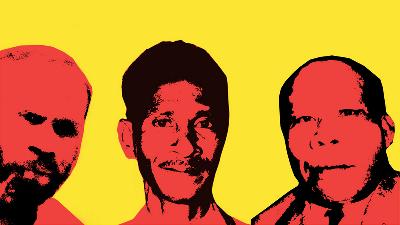
Why did the prominent figures from Papua fail to bring the Papuans to support the Republic of Indonesia?
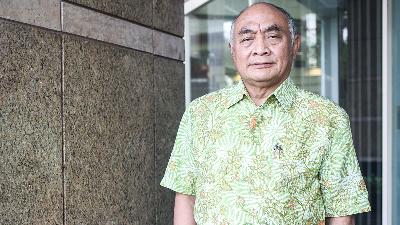
The government faces difficulties accommodating kidney donors and recipients. The need for kidney donors is high, but the supply is very limited.
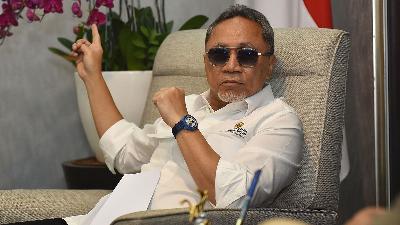
Trade Minister Zulkifli Hasan on the issues ranging from sea sand export policy to Prabowo Subianto’s bureaucratic management style.

There is increasingly compelling evidence of a gratification in the form of a private jet for Kaesang Pangarep. The KPK could investigate this thoroughly.
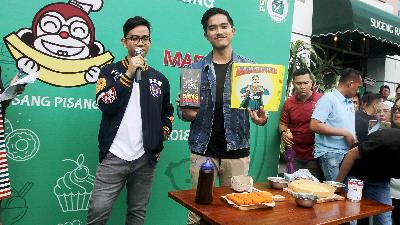
The culinary businesses of Gibran Rakabuming and Kaesang Pangarep are fading. This seems to contradict their massive financing.

Persis Solo attracts substantial funding since Kaesang Pangarep acquired its shares. Sponsors tend to be influenced by the prominence of the owner.
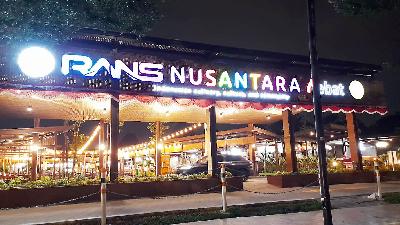
Startups owned by Gibran Rakabuming Raka and Kaesang Pangarep are flooded with venture capital injections. Assisted by a presidential advisor.

A photograph of a private jet window exposes Kaesang Pangarep and Gibran Rakabuming Raka’s connections to a network of business actors.
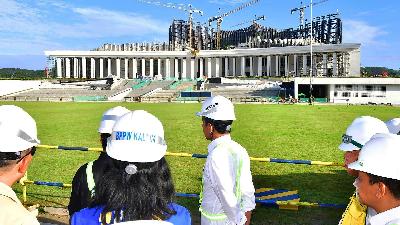
President Jokowi’s plan to move his office to the Nusantara Capital City missed the initial target of July. Water facilities are not yet ready.

The development of the Nusantara Capital City has the potential to cause massive environmental damage. The claim that it will be a sustainable forest city is just empty words from officials.
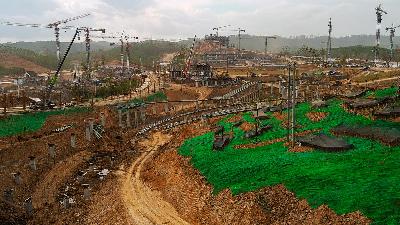
Deforestation covers an area of 2,464 hectares in Nusantara Capital City. Functional conversion of land threatens watershed areas, giving rise to a source of floods.

The Prabowo-Gibran National Campaign Team Chief Rosan Perkasa Roeslani responds to allegations of election frauds that purportedly benefitted the pair.

The names Gibran Rakabuming Raka and Budi Arie Setiadi briefly emerged as the Chairman of PSI. There were lobbying efforts to promote Kaesang Pangarep to Jokowi.

Subchi Azal Tsani’s right of reply and Pertamina’s pension fund management.

A student at the Darussalam Gontor Islamic Boarding School was beaten to death by his seniors. Supervision of pesantren is still weak.
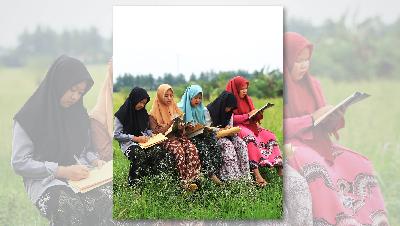
Pesantrens or Islamic boarding schools that teach about the environment and gender equality open up the orthodoxy. Education through religious teachings has a significant impact.

The explanation of Hery Susanto, an Ombudsman member, about the nickel mining licensing muddle in Central Sulawesi.

Sexual violence in pesantrens (Islamic boarding school) in Bandung can be attributed to the lack of oversight on religion-based education institutions. Pesantrens should no longer be allowed to operate as closed institutions.

The Nusantara vaccine is not suitable for Indonesia, which needs to inoculate large numbers of people. Existing vaccines are already proven effective for old people and those with other health conditions.
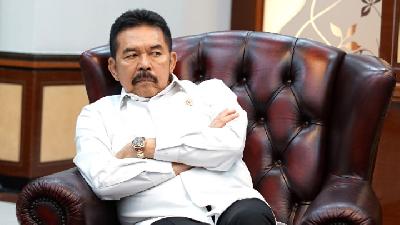
The Attorney-General Office (AGO) suddenly came under public spotlight following the graft case involving state life insurance company, Asuransi Jiwasraya. Right after the investigation was launched on December 2019, the AGO led by Sanitiar Burhanuddin moved fast by first coordinating with the Immigration directorate-general to impose travel ban on 13 people, including the former company board of directors, and later establishing and detaining five of them as suspects.

Laura Basuki succeeded in becoming Susi Susanti, and presented this Indonesian badminton player’s psychological dilemmas which were little known to the public.
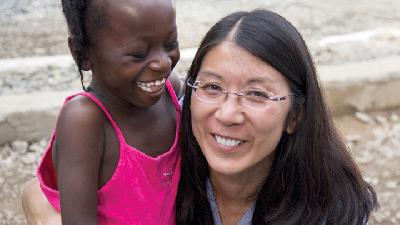
Established in December 22, 1971 in Paris, Médecins Sans Frontières (MSF) or Doctors without Border, a non-governmental medical organization, almost always has its presence in conflict zones as well as countries affected by endemic diseases. Last year, MSF has managed considerably huge aid operations in three countries—South Sudan, Congo and Yemen—which have been struck by deadly conflicts and diseases.
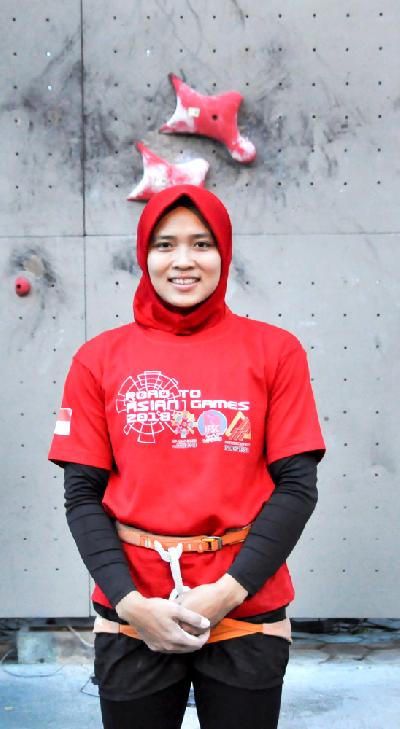
World speed wall climbing champion, Aries Susanti Rahayu, has a unique reason for pursuing the climbing speed challenge rather than the 'lead' or the 'boulder'.

Though women are said to occupy an important position in Islam, societal taboos often prevent women from assuming an active role. Several girls-only pesantrens (Islamic boarding schools) are trying to counter such views by teaching their students gender equality, emancipation and diversity. Efforts to elevate women's position and their role in society were topics of discussion at the Indonesian Women Ulema Congress in Cirebon, West Java, late April. The Congress attempted to bring the woman's voice into mainstream interpretations of Islam thus far dominated by male clerics.

Last Thursday dozens of workers were toiling away to complete the construction of a number of residential units at the Azzura Residence in Bogor, West Java. Some could be seen sifting sand, others scraped and painted the walls of the half-finished houses. None of the workers were seen smoking or drinking water as it was the Ramadan fasting month. Luckily Bogor City was not too hot that afternoon.

When the National Counterterrorism Agency (BNPT) declared that at least 19 pesantren (Islamic boarding schools) showed evidence of teaching radical thought, we realized just how critical the situation had become. Those 'radical' schools can be found in Jakarta, Cirebon, Ciamis, Cilacap, Solo, Lamongan, Aceh, Makassar, Poso and North Lombok.
Statistically, the figure is almost meaningless, given that some 28,000 pesantren can be found throughout the nation's 33 provinces, attended by about four million Islamic students. However, radicalism-particularly of the kind that has hardened and manifested itself in terrorism-is not just a matter of statistics. Its scope is difficult to grasp, particularly when it is most likely infused with flammable factors such as social injustice.

HASAN Nasbi uttered some threatening words when Tempo met him at his office in South Jakarta last Tuesday. The Cyrus Network CEO said he was uncomfortable being interviewed about the funds allegedly contributed by the land reclamation developers to the Friends of Ahok organization, reportedly channeled through his political consultancy agency. "It would be nice if you wrote that," he said, "so I can sue you after."
Hasan denied Indonesian Democratic Party of Struggle (PDI-P) politician Junimart Girsang's statement that he had received Rp30 billion. He did not react when Tempo told them that the information had reached the Corruption Eradication Commission (KPK), after one of his subordinates testified on April 15. Tempo reporters Anton Aprianto, Wayan Agus Purnomo and Prihandoko recently spoke to Hasan.

Minister for Women's Empowerment and Child Protection Yohana Susana Yembise, 58, cannot afford to take it easy yet, even though Law No. 35/2014 is ready to be enacted. Better known as the Bill on Castration, this piece of legislation will soon be deliberated on at the House of Representatives (DPR).
The bill was drafted by three ministries at the instruction of President Joko Widodo as a response to the emerging cases of sexual abuse. The ministries involved are the ministries coordinating human development and culture, social affairs and women's empowerment and child protection. "The President has instructed the attorney-general and me to monitor the passage of the bill," said Yohana in a recent interview.

Standing apart from other pesantrens (Islamic boarding schools), is the Abdurrahman bin Auf Pesantren, which not only teaches religion, it also tries to instill in their students self-reliance and confidence by training them in business and farming skills. "Our objective is to teach them to go beyond merely reading the Qur'an, but actually living life as according to the Holy Book," said Akbar Mahalli. He is the business manager of the Abdurrahman bin Auf Entrepreneurship and Agrobusiness Pesantren, popularly known with its acronym, Perwira AbA, located at Bulan village, in the subdistrict of Wonosari, Klaten regency, Central Java.
Today, about 40 percent of students who attended the school from 2000 to 2015, or about 350 of them, are successful entrepreneurs. "Sigit, one of our graduates, owns a thriving toy-making business, with an outlay of Rp5 million a day," boasted Akbar. The success of Perwira AbA can also be seen in the awards it has won in various competitions. The school won first place at the Central Java Provincial Competition for Food Sustainability, a few years ago.

According to the Global Financial Inclusion Index, Indonesia's position falls below 20 percent, lower than Malaysia (66 percent) and Thailand (77 percent). To improve conditions, the government recently amendended Law No. 1/2013 on micro-financing agencies (LKM) to give the marginalized people more access to financial services. The Financial Services Authority (OJK) was then given the mandate to formalize more than 630,000 LKM all over Indonesia so that they can comply with existing regulations.
Mohamad Ihsanuddin, however, admitted that this was not easy. "We must promote it and educate civil servants in the regencies to supervise and monitor the LKM," he said. The OJK is given until January 2016, exactly one year after the law took effect, to ensure that those micro-financing agencies have the proper licenses to run their businesses, a very challenging task for an agency that was set up only three years ago. Ihsan spoke to Tempo English reporter Amanda Siddharta at his office last week.

Singapore lives up to its claim as the 'Garden City' from the moment one arrives in Changi Airport. The futuristic airport boasts six indoor and outdoor gardens, offering a green sanctuary for weary travelers. Every bit of space in the 13 square kilometer site is used effectively, so trees and flowers can thrive within the confinement of metal and glass.
The Garden City concept was coined by Singapore's first Prime Minister, Lee Kwan Yew, on May 11, 1967. His vision was to transform the country into an environmentally friendly living space with clean air, providing its citizens with a comfortable living environment.

Noor Huda Ismail
The Jokowi administration hopes Nusantara Islam (IN) will be the key to success in the state's de-radicalization efforts, which have often been labelled as a series of failures. De-radicalization efforts thus far have been considered ineffectual for two reasons. First, efforts were unable to eliminate the threat of terrorism since the first Bali bombing in 2002, and second, the program has not prevented hundreds of Indonesians from travelling to Syria and Iraq to fight with IS and An Nusro.

Splitting through green fields, the country road, measuring about five meters in width, ends at the convergence of the Cimanuk and Cilutung rivers. In the middle of the rivers-part of the Babakan Anyar village, Kadipaten, Majalengka-dozens of miners are busy loading their boats with sand to be transported west by trucks waiting near the river bank.

IN 1998, environmentalist Prigi Arisandi stumbled upon data at the Surabaya City Health Office that stunned him. He found that 60 percent of children in Surabaya suffering from cancer came from one residential area, the neighborhood around Surabaya River, a branch of the Brantas River. "The river water is polluted with mercury and chemicals from the waste of 800 factories," said 39-year-old Prigi.

With an agile mind and a memory sharp as a whistle, psychologist and scholar of Chinese literature and culture, Myra Sidharta had cause to celebrate her 88th birthday early this month. "I seldom observe my birthday. If I had known it could be this merry, I would have given more parties," she said with a twinkle in her eye to the amusement of the more than 200 hundred guests. "This year is special because the age 88, when drawn together, looks like the Chinese letters for double happiness," said art dealer son, Amir. The day also marked the launch of a compilation of Myra's articles and papers from almost four decades, titled One Thousand Smiles and a Single Teardrop.

ZULKIFLI Hasan slammed the newspaper on his desk. He stood up and pointed to the newspaper bearing the headline, Zulkifli Hasan Curi suara DPD (Zulkifli Hasan Steals DPD Vote). "How dare they use the word 'steal'!" he exclaimed. Trying to calm himself, he added, "Ah, never mind. It's alright. I don't want to make it more explosive."
As the newly appointed speaker of the People's Consultative Assembly (MPR), he said his main objective was to create a peaceful environment prior to the upcoming October 20 presidential inauguration. He promised to communicate with all parties concerned to ensure everything goes smoothly. "I will meet with Pak Jokowi and Pak SBY," said the former forestry minister.

Indonesia has gone through incredible changes since reformasi was launched 15 years ago. Its socio-economic progress has been widely acknowledged by the international community. Yet, as a recent report of the Gini coefficient index shows, the development gap between the islands in Indonesia have in that period, widened significantly. Journalist, author and epidemiologist Elizabeth Pisani was first posted in Jakarta in the late 1980s, returning between 2001 and 2005 to work with the Health Ministry as an epidemiologist researching the human immunodeficiency virus (HIV). In 2011, she returned again to research for her book, Indonesia Etc. In Jakarta recently to promote her newly-launched book, Pisani spoke with Tempo contributor Melati Kaye about her recent travels in Indonesia.
You mentioned that Indonesia's outer islands lags behind Java, in developing 'the engines of social growth': education, Internet and infrastructure. Can you explain?

The sound of children laughing and giggling could be heard that morning. The youngsters looked afraid when they tried to feed carrots to some caged deer. Their parents were busy photographing their young ones and posing for selfies.
This scene did not take place at Taman Safari jungle park or the Ragunan Zoo, but at the Insan Cendekia Madani (ICM) Boarding School, an Islamic school in South Tangerang. The deer were part of a zoo in the school grounds.

To break the pesantren stereotype of a school that produces Islamic radicals, Subki Sasaki set up an institution based on interfaith principles.

The exact origin of the arisan, a social gathering of women meeting every month to pool their money and take turns in claiming the pot, has puzzled anthropologists and sociologists. Yet, it has become a tradition adopted by womenand sometimes menfrom all strata of Indonesia society, not merely to meet and chitchat, but to save their hard-earned, household money. In some parts of Indonesia, arisan funds helped to lift communities from abject poverty, particularly when they are used collectively to build homes, ensure food security and good nutrition or improve sanitation in villages. Tempo English reports from Mantehage Island in North Sulawesi, Lelamba village in Southeast Sulawesi and Padang Pariaman in West Sumatra.

Polish diplomat Andrzej Wawrzyniak was seen as a brave man when he chose to stay in touch with Sukarno (affectionately known as Bung Karno) following the mysterious events of September 30, 1965, in which an attempted coup set in motion the events that would remove Indonesia's first president from power. Wawrzyniak was like a member of Bung Karno's family.
His relationship with Bung Karno involved an element of art. After retiring from his diplomatic work, Wawrzyniak started collecting heirlooms from Indonesia and other Asia-Pacific countries. Kris daggers, knives, spears, batik fabrics, paintings, and sculptures from the archipelago that he collected from 1961 to 1971 are today displayed at the Asia and Pacific Museum in Warsaw.
Now in his 80s, he is currently in intensive care in the Polish capital, suffering from diabetes. The doctor has confined him to bed. However, when he heard an Indonesian wanted to visit him and view his museum collection, he insisted that the doctor allow him in. The following is the report by Tempo reporter Elik Susanto, who met Wawrzyniak last July.

The fair trade movement came to Indonesia during the 1990s, when a number of craftspeople and artisans realized that the concept could provide a fortuitous merger between business and social welfare, which could lead to sustained economic growth. They established a fair trade movement among their communities. True enough, when the financial crisis hit Europe and the USthe northern markets for their productsand put a dent on their orders, they were ready with innovative and creative solutions. Tempo English reports on such efforts from the islands of Bali and Lombok, ahead of World Fair Trade Day on May 11.

With production today reaching 26.5 million tons a year, Indonesia has become the world's largest producer of raw palm oil. On February 15, the Indonesian Association of Palm Oil Producers predicted that the production will keep on increasing to 40 million tons a year by 2020. But this achievement has not been without cost. Every year, Indonesia loses 1.5 percent of its forests. How to balance industrial needs with environmental conservation? The solution may be in Dosan, a small village in Riau province, where its farmers manage and maintain their oil plantations without using chemicals or clearing forest land to plant more trees. Yet, their yields have doubled. Tempo English reports on a success story from the Siak regency in Riau.

A number of researchers have been to Holland in search of traces of the Sundanese dangding poetry of Hasan Mustapa, trying to find original manuscripts of this little known literary figure.

Originally from Canada, Susan Allen uses modern shadow puppet plays to help the children of expatriates adjust to Balinese culture.

A woman who bought a Nissan March hatchback filed a suit against the automaker for its advertised claims of fuel efficiency. Nissan lost in court and filed an appeal.

Tjokro regularly expressed his views in the Oetoesan Hindia daily. His writing style was emulated by many, including Sukarno.

The superiority of the communal house of Wae Rebo lies in its knot-tying construction, said to be the rebirth of old Nusantara or archipelagic architecture. It is quake-proof and suited to local environment conditions.

Judges dropped the charges against Susandhi because the police questioning was flawed. The police and the AGO were excessive in carrying out their duties.

A change occurred in the Lambusango Forest Conservation Program. Rural business development outside the forest territory is considered a more appropriate solution for the Conservation Program compared to the conventional society-driven forest resource management.

Islamic boarding schools or pesantren do not only provide instruction in religion but also in business. Other similar schools have become pioneers in empowering their surrounding communities. This is their social mandate.

The Sidogiri Pesantren runs a cooperative with 24 branches, earning annual revenues in millions of rupiah.

Santri or students of Islam are encouraged to care for the environment. Local residents are provided with trees.

Hasanuddin University researches and develops cacao. A special lab will be built to boost its production.

Local school subjects in the Thousand Islands relate to daily affairs. It’s an example of a pleasant curriculum with instant benefits.

FOR the past 42 years he has been remembered with feelings of hatred, yet with astonishment. Dipa Nusantara Aidit was only 31 years old when he led the Indonesian Communist Party (PKI). He only needed a year or two to make the PKI one of the top four political parties in Indonesia. The PKI claimed 3.5 million supporters at that time, which would have made it the largest communist party in the world after the Soviet Union and the People’s Republic of China. Aidit dreamed of a revolution, envisioning a classless Indonesian society. However, he was undone by the cataclysmic events of 1965. After that, he became a myth. Just like the events of the September 30 Movement, known in Indonesia as the G30S, the stories about him are filled with myths and tales. Who was the real Aidit?

This is possibly the first time Foreign Minister Hassan Wirajuda has diligently lobbied DPR members. He made an effort to soften the stance of members who are determined to sign the interpellation initiative, officially submitted last Wednesday.

Sunaryos installation work at Plaosan Temple became an independent work, separate from the film.

The ex-Minister for the Environment is accused of taking bribes from Monsanto. He must prove he is clean if he wants to protect his reputation.

Susilo Bambang Yudhoyono is leading in the second round of the presidential election. At Kebagusan, Taufiek Kiemas drains his latest cup of coffee.

Budhisantoso’s political career is full of surprises. He is not setting his eyes on a government position.

Although attempts to gain control over 22 islands of The Thousand Islands territory have been thwarted, Banten province officials remain intent on annexing the islands.

Following the founders resignation, thousands of Texmaco employees have been demonstrating continuously, demanding working capital for the company.

Some elite arisan gatherings have become a sort of one-stop shopping affair where wares are offered at attractive prices.

The pioneer of women’s cooperatives with a system of personal guarantees among members has helped thousands of women improve the family economy.

Despite a budget of more than Rp32 billion, Indonesian athletes will only bring home a fistful of gold medals from the Asian Games in Busan.

The Financial Sector Policy Committees Legal Assistance Team has recommended firm action be taken against 14 debtor bankers. They include Nirwan Bakrie, Siti Hardijanti, and Marimutu Sinivasan.

Prisoner Bob Hasan has transformed Nusakambangan, Indonesia's Alcatraz high-security prison island, into a comfortable abode. Money can obviously buy special treatment in the prison, other prisoners' loyalty, as well as prestige.

ISMAIL Hasan Metareum sat on a wheelchair. Pale and weak, the thin-faced and bespectacled man was nursing a broken leg, the result of a fall at the mosque. But that did not affect the spirit and attention of this 74-year-old born in Pidie, Aceh when discussing the never-ending problem of his birthplace. Moreover, since the idea of a Bureau (desk) on Aceh was discussed by Vice President Hamzah Haz mid-January, Metareum seems unconcerned about his leg's condition. His wheelchair notwithstanding, he still travels around, lobbying to finalize the idea of an Aceh Bureau.

The government is stumbling in its moves. To meet the requirement of additional assets, Anthony Salim and Sjamsul Nursalim have given up substandard firms and proposed counter schemes. They have also demanded the same treatment as that enjoyed by Marimutu Sinivasan.
Independent journalism needs public support. By subscribing to Tempo, you will contribute to our ongoing efforts to produce accurate, in-depth and reliable information. We believe that you and everyone else can make all the right decisions if you receive correct and complete information. For this reason, since its establishment on March 6, 1971, Tempo has been and will always be committed to hard-hitting investigative journalism. For the public and the Republic.